Text
Epilogue
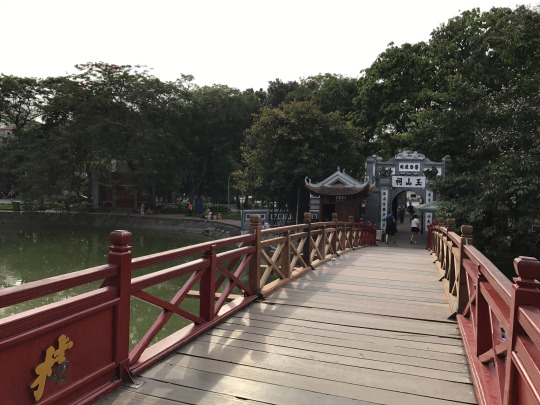
My internship was a partnership between Mount Holyoke College and The Gioi Publishers. I'm deeply indebted to both for providing me with the greatest learning experience of my academic life.

Anyone reading this, know that such experience is good for your career, for your body, mind, and spirit.

If you have a chance, go!
Travel, be on your own for a while, experiment, learn, learn, learn!

Namaste!

#mount holyoke college#thegioi#Summer internship#southeastasia#studentlife#authorslife#writerslife#namaste#writerstravel#Travelblog#Adventure#busybeinghappy
1 note
·
View note
Text
“Home, Home Again,
I like to be here when I can...”*
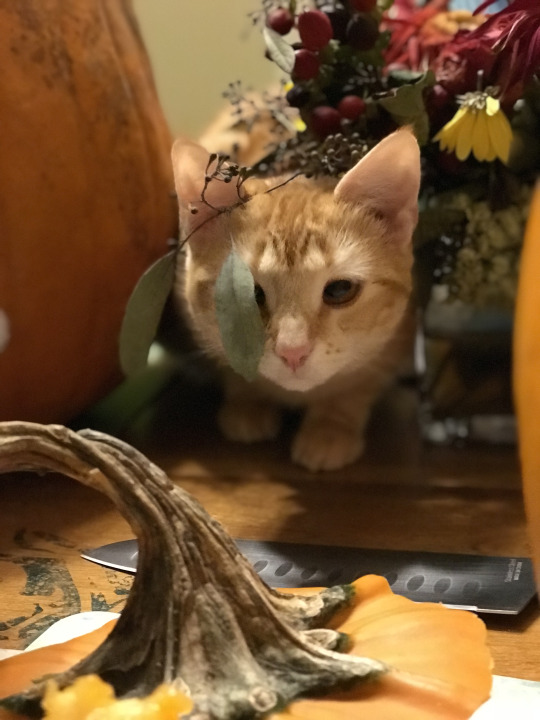
It's bittersweet to come home because I feel like a great adventure has come to an end. But perhaps it's not so. Perhaps a greater adventure is to live life with dignity, courage, and authenticity. Many issues expect me at home, from a personal level to total national chaos. There's much work to be done. After an uneventful flight, I land on JFK. The immigration officer peruses my passport and says, with a smile, "you're a world traveler!"
"Not exactly, not yet," I answer, humbled by the thought of my friend Anush, who really is a globetrotter.
Through the app Find Friends my son JeanLuc finds me waiting for my luggage. He has grown in my absence, his beard has thickened and he looks more mature overall. I hug him, smell his scent, listen to his heartbeat -- resting my cheek on the best place of the Puniverse, as I used to say when he was tiny. We meet my daughter Katrina in the car, and she's driving and that's good, because she's not into hugging. She does make an exception for birthday and Christmas, though, sweet thing that she is.
In the car, we share stories of the last two months, but not much, since I don't want to repeat everything I want to say when we're finally all together.
After three hours or so I'm home, seeing the rest of the family, which includes four new pets! It's when I hug my oldest son Marcelo, though, that I break down and start to cry because I'm so happy to be home and I've missed them all so much! Knowing his mother as he does, he has a surprise for me, which is a huge map on the wall, where we have fun placing color-coordinated thumbtacks on the places we've been.
During my time away I didn't allow myself to be homesick, because that would only take away from my experience abroad, but being around them all is like heaven -- or maybe heaven is just another word for home.
Key Takeaways:
1) An internship reveals as much about ourselves as the path we're contemplating taking. Sometimes a job is more glamorous from a distance than in the thick of it. Interning at the company of one's choice allows for an inside look at the day-to-day business. What did I learn at The Gioi? I learned that editing is hard, not only for me but for everyone. It takes work, and it's not always fun, but if making a messy paragraph shine appeals to you, then the time sitting and staring at a computer screen is worth it. However, -- and here's the takeaway -- now I know that I can do it. I can write and I can edit. Maybe that's not as surprising to anyone as it is to myself. I don't like to write all the time, and I don't like to edit always, but the work satisfies in me a deep need for connection and self-expression. I could say that I write to understand, and I edit to be understood. Or something like it.
Working at The Gioi showed me that the final product on a magazine shines because of hours of intense, laborious and boring work the staff is willing to put into a piece. Editing is work done both alone and in collaboration with a team. I worked alone at my desk, but I was just one of the many hands those texts passed through before becoming ready for print. Although separated, we had the same goal; make a text as good as possible.
2) The pros of living alone. I think everyone should live alone at least once in their lifetime. If not completely alone, with busy roommates. I did not live alone before getting married and starting a family of my own. I wish I had. By living alone you learn to become self-reliant. If you fail, you deal with the consequences, and the next day you do better. If you leave your bed unmade or a carton of milk outside the fridge, when you come home it's there, just the way you left it, or, in the case of milk, spoiled as a consequence of your negligence. No judgment from anyone, but no helping hand either, so it functions like a straight look in the mirror when we contemplate ourselves and all our shortcomings. Being so, living alone teaches humility, self-reliance, and confidence.

Another great thing about living alone is that you have a better chance of following your plans without being derailed. If you decide to sleep instead of reading or watch a movie instead of sleeping, that's up to you, and if you regret your choice the next day, that's also your problem, and you know you can't peg it on anyone around.
A subtler aspect of living alone is that you learn to manage your emotions, as there aren't people around to distract you from your feelings. Nobody makes you mad, for example, you get mad all by yourself, with thoughts you choose to have. That, I believe, is always the case, but when you're alone that becomes undeniably clear. You must rely on yourself as a source of wisdom, comfort, inspiration, entertainment and anything else you need.
3) Perspective. We have to leave sometimes. Leave a relationship, leave a house, leave a job, a country... in other to see it better. If by diving into something we take a closer look, by moving away from a situation, we see it in an entirely different angle. While in Southeast Asia, I didn't hear about Trump's latest tweets. It wasn't news, it just didn't matter for them what the POTUS said, did, or said he did or didn't do. It was so refreshing! I also learned that most people in that part of the world are not as scared of North Korea as they are of the United States. Well, considering our mutual history, can we really blame them? This same bird's-eye view I can apply to enlighten aspects of my personal life.
4) Traveling is an art, and, as with watercolor, writing or pottery, the more you practice the better you get at it. There are many kinds of travelers, and internship, work, or studying abroad have its own implications, but overall, leaving home reveals your identity as a traveler. What places are you attracted to, what do you want to see, what do you want to do? Do you travel to escape, to rest, or to learn? Do you find a cozy place and make yourself comfortable as you watch the natives from a peephole? Or do you mix with the locals, learn a new language and try new things?
I admire the latter, but I'm not an extrovert, so I don't throw myself into a new situation. I also don't hide from the wonderful opportunity to see new things, meet new people, eat different foods and do different things. Whenever I travel, though, I realize that I need to do so more often. Since traveling, by definition, is a state of transition, I want to learn to move more gracefully from one point on the planet to another. That's the art in it, the dance in the storm, so to speak. And as in every art, if you do just what you plan, what's the art in that? More important than following through some preconceived idea, is to be present in the moment.
5) So, there's the saying that "if you cut too many corners, you end up going in circles". Another reminder says that when you cut a corner, you end up with two more. In Brazil, we say that, by trying to avoid taking one step, we take two. That relates to my attempts at cutting costs. No matter how much one plans, when traveling there are always spur-of-the-moment decisions -- or there should be if you're living in the moment -- and cutting costs is an important practice if you're on a budget, but not every dime saved makes sense. Sometimes it's okay to take a cab, even when there are buses available. Sometimes it's okay to go to a restaurant, even when you can cook at home or get an inexpensive meal on the street.

6) Skin Shedding. Closely related to this new perspective, is the shedding of skin, the throwing out -- or letting go -- of what is no longer working for you. I got sunburnt in Phu Quoc Island, which led to probably the worst itch I ever had and later, to skin shedding. Although the process was far from pleasant, it symbolized a very special time in my life, when I'm letting go of much that I thought was part of my identity. I'm renewing myself. The process is both painful and beautiful. You cry for the skin to which you were once so attached which now brings you more discomfort than anything else. So you let it go. Then one day you look at your shoulder and see that the new skin is clear, healthy, and beautiful. You've been born again!
7) Completely different, but just as good. By the time you travel alone, be it for an internship, to study abroad or any other reason, you're probably over the age of eighteen and might have developed a philosophy of your own. But as you immerse yourself in another culture you realize that other people do things differently, sometimes exactly the opposite of what you think is right. That's a great opportunity to develop some humility. Yes, your philosophy is great, but mostly for yourself. If people in a different part of the world do things differently it's either because it's the only viable way in that environment or because it's working for them. And here's the takeaway: study different angles of your own idea. Learn, expand your views, enlarge thine soul.
8) Think Abundance. I have spoken extensively about it while talking about what I call scarcity mentality. This experience was a great way to immerse myself in a culture that prides itself on making do with less. It is a fact that in the United States there is too much waste, and better management of resources is something that we must learn, but sometimes that scarcity mentality can become a way of life, part of the culture and it stops making sense. To think abundantly is to understand that resources are always available, but if you go to the ocean with a spoon, that's how much water you'll get. Saving is good and must be encouraged, but shouldn't be the modus operandi. A better goal, in my opinion, is to do the best you can with what you have.
9) Order and Progress. It's pretty clear that basic organization leads to better planning and better execution. Traveling through Southeast Asia constantly reminded me of that. Some schools teach this but it must be reinforced by the culture, with social expectations and policies in public places. Brazil, for example, dwells in chaos. The culture deals with that aspect of its people, reinforcing it with cliches like "o jeitinho brasileiro", (the Brazilian way), which allows for creative loopholes in every sphere of society. Other cultures, such as the Japanese and Chinese, pride themselves in cleanliness and order. Good fruits come from such values. And that's what this trip reminded me to do; better observe organization in my own life.
10) I've always believed that people should leave their country of origin and live in another place for at least a year. This experience only reinforced that belief. I can't think of anything else -- except, maybe, parenting -- that changes one's perspective as much as immersing into another culture. Everything you know and take for granted, like the language spoken around you, the food, the currency, social values, all that changes but you, at first, remain the same. It's like taking a piece from one puzzle and mixing it up with pieces from another puzzle. At first, there's no place for that piece in that society and you feel extra and useless. Little by little you learn to assess your surroundings and learn new things. Learning happens when we modify ourselves. Without change, there is no learning. And this learning reshapes you, so soon you find that you do fit into that society. People count on your presence, on your input, and on your contribution. You don't stop being who you are, you just enlarge your worldview to accommodate new perspectives.
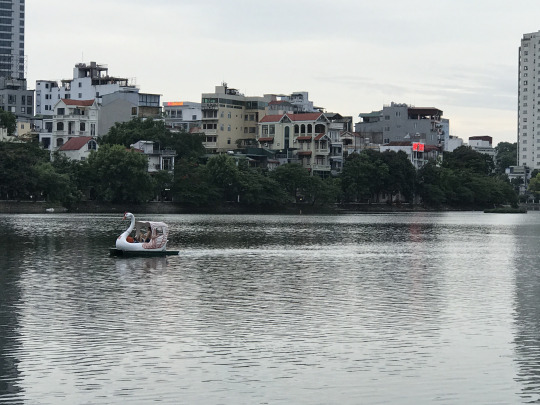
"It's all worth it if the soul is not small", wrote Portuguese poet Fernando Pessoa. However, the soul, like the body, needs food for growth. Traveling, reading, experiencing life in all its colors, shapes, and sounds, broaden our existence and deepen our understanding and therefore must be highly encouraged. I'm proud of Mount Holyoke College -- and immensely thankful -- for the college's efforts to provide students with experiences of this kind.
#mountholyokecollege#francesperkins#Summer internship#thegioi#Vietnam#southeastasia#china#traveling#writerslife#studentslife#Hanoi#cambodia#tailand#Laos#keytakeaway#pink floyd lyrics#springfieldma#Adventure#life experience#learning opportunities#busybeinghappy
1 note
·
View note
Text
Hong Kong
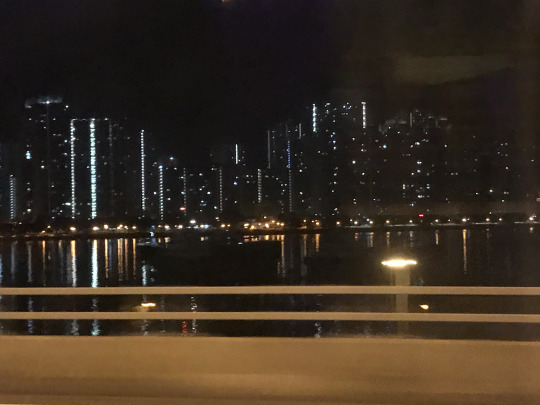
Finally, we leave Hanoi and quickly land in Hong Kong. I have decided to leave the airport and visit the city. In order to do that, I have to go through immigration and require a visa. However, the huge line is moving rather slowly, it's past 11:30 pm and I've been told that the last bus to Hong Kong leaves at midnight. I speak to an attendant at the airport who urges me to get in line as soon as possible and try my luck. I get to the immigration desk with only a couple minutes to spare, and the attendant quickly gives me a visa -- a little piece of paper, really -- allowing me to stay up to 90 days in Hong Kong. Did you hear that, China?
Hong Kong Internation airport is large and it can be confusing if you, like me, don't know it well. It takes me a while to pass through customs, as there's another line, and finally, I'm out and looking for ground transportation. I see signs for buses leaving for the mainland and run to buy a ticket. It's fortunate that I have exchanged VND into HKD in advance, for I have seconds to make a decision where to go. I have no idea where I'm going, to be quite frank. The lady behind the counter explains to me that this bus, leaving now, will go to Port-whatever, is that the one I want? I have no idea, and what do you say when you have no idea? "Yes!"
She hands me the ticket and charges me 100 HKD. The information I had was that it would cost me 40 HKD, but I have no time to discuss pricing. I get the ticket and run in the direction she indicates, where a limovan is waiting with the engine running. I was expecting a bus, not a limovan, but the driver takes my ticket and rushes me in, as I'm the last passenger of the night. There are seven more passengers in the van, and as soon as we are seated, the driver asks for our passports. I have said it before, I do not like to give out my passport since it's my only form of identification in these parts. Perhaps I have seen one too many movies of people crossing the frontier into the United States, who give their passport to the coyotes, and won't see their document back unless they give them all their current possessions and anything they will ever earn, plus their children's heart and their own. But, in the name of expediency, everyone turns their passport to the driver, and we start to move. I realize too late that I should have kept the visa -- the little paper -- from inside my passport. Oh, well!
We're moving. For a long time, I can't see much more than highway and some lights in the distance. I'm expecting to see more of Hong Kong but about an hour later we arrive at some security post, where our passports are presented, reviewed and thankfully, returned to us. We ride for about five more minutes and we've arrived. But where? I see a plain official-looking building where a lot of people are rushing in, even though this is past one a.m.. I get in too, and only there realize my mistake; this is a port to mainland China, not Hong Kong Island. I approach a friendly guard and ask for help, which consists of 'how do I get to Hong Kong?' Since he doesn't speak much English, he kindly directs me to an attendant who is busy doing about a hundred things. At the risk of blunt generalization, I shall say that I have observed in the West that women are better at multitasking than men. It must be something to do with childrearing and the demand that running a household while taking care of little ones impose on a mother. What about women who are not mothers? My theory is that they develop these skills in preparation and imitation, and it's probably genetic too. This is a long-held view, but now I see that there are actually studies confirming my opinion, as reported by BBC in 2013. Check it out!
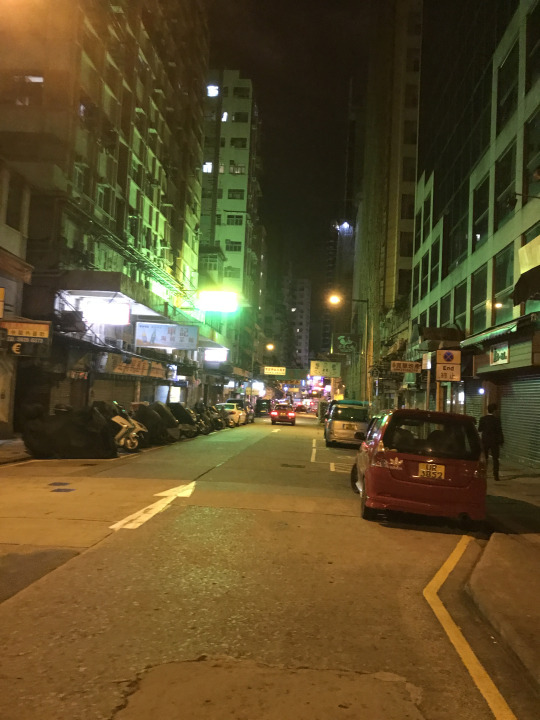
However, while waiting for this agent to help me, I'm amazed at his ability to multitask. He answers the phone, works on his computer, notices colleagues across the room and informs them or gives them a key or a paper, and he does all that with the grace of a loving and energetic mother. He turns to me and asks for my passport. He takes it to the computer and studies it, raising his eyes often to greet someone or solve another problem. Finally, he comes back to me, shows me my passport open on the page with the Chinese visa and states the obvious. "This visa only allows one visit to China, and you've already used it."
"Yes, I know, I don't want to go to China, I want to go to Hong Kong."
"But this is the border to the mainland."
"Yes, I understand that. I came here by mistake. All I want to know is how to get to Hong Kong."
"Oh, okay," he says, with the same smile and grace as before. I wonder what kind of Zen practice he has learned that allows him to be this genuinely polite and cheerful person. Very different from the attendants on the border with Vietnam and different also from other people behind a counter in, let's say, New York City, with murdering eyes and a plastic smile.
He calls a tall and elegant female officer and asks her to guide me. She takes me to a bus stop outside, where a small bus is parked. "How much is the fare?" I ask, to which she replies, "it's free." As she signals to the driver I think I either misheard or her English is limited. But it turns out the bus is only taking me across security, to another station, where a handful of buses are parked.
The problem is that there are a couple of booths selling tickets for different parts of Hong Kong, and I have no idea where I want to go. I talk to one guy working at a liquor store, the only store open at this time. He doesn't speak English, but we use his cell phone to communicate. I ask him for suggestions and he asks me if I want a place that's more fun. I tell him I'm hoping for sights, not exactly fun since I have no idea what kind of fun he has in mind. He clarifies that he means clubs and dancing. I repeat I want to see stuff, not really do anything. He thinks this over. He tells me that Hong Kong is beautiful and I'll see great sights anywhere I go, but ends up writing a number on a paper. I buy a ticket for the bus he suggested (for 44 Hong Kong Dollars), which is about to leave. During all that it dawns on me that I am in mainland China, not Hong Kong, and I have to show my passport a couple of times until I'm on my way to the island.
The bus is fairly full, and I wonder where all these people are going at this hour. They're talking in a bunch of languages, mostly Asian, but sometimes I hear French, German or English as well.
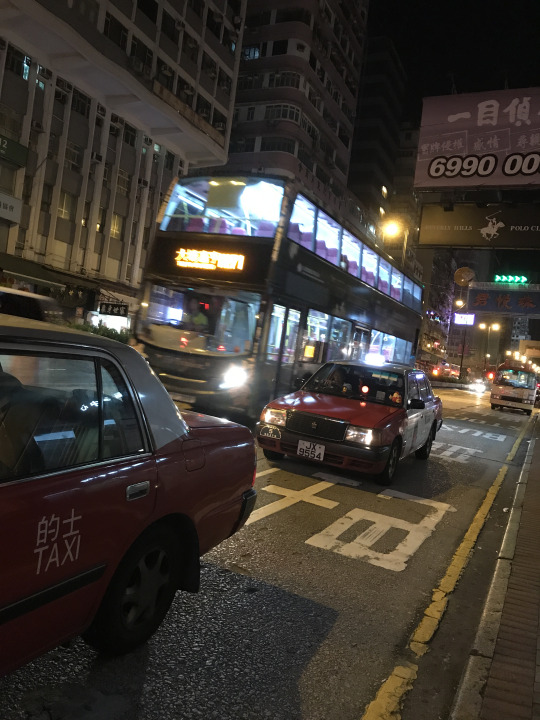
Where do you stop when you have no idea where you're going? Since I'm seeing so much from the bus, I have no hurry to get out. However, there are some neighborhoods with open restaurants and clubs while other neighborhoods are deserted. I don't want to stop on those.
I end up going to the final station where I try to find out which bus I should take to the airport, even though I still have hours to explore the city. I'm told I must take the bus A21. Where does it stop? The gentleman gives me directions, which I hope to remember. Leaving the station I see two kids, probably in their late teens, hanging out. I ask if they speak English and both say yes, so I ask them a bunch of questions about Hong Kong, especially in what, if anything, it differs from China. Just like night and day, they're quick to tell me. Hong Kong has a different language, currency, and policies. Hong Kong is extremely open to western business, culture, and values, while mainland China is not. Also, there are many English-speakers in Hong Kong. In fact, most signs have an English translation, which makes being here easy and comfortable. And of course, in their visa processing, mainland China and Hong Kong are completely different. Two things about these kids strike me as remarkable; how friendly and respectful they are and the fact that they're talking on the street, hanging out as though it's the middle of the afternoon, when in fact is about 2 in the morning.
I quickly find the street where bus A21 stops at several points, and, keeping it in the back of my mind, explore the neighborhood. Although many shops are closed, there are many people on the streets. Restaurants, cafes, and clubs are open. I find a nice park, but that's also closed for the night. I don't remember ever seeing a closed urban park and I wonder the reason for having gates at all. I buy a banana at a produce shop, but what I'm really looking for is a place where I can sit with a cup of tea and my laptop. Not finding anywhere else, I enter the funkiest McDonald's I have ever seen. However, this McDonald's is divided into two distinct ambiances, one for breakfast, and the other for... liquor? They do have things like muffins and coffee but that counter won't be open for another five hours. I look for another place. There are a lot of street vendors, some of them in the process of closing shop for the night. I check their merchandise, hoping to find a Hong Kong magnet, but what I see is a great assortment of bongs, lighters and other stuff which I don't know the name or the function. Stand after stand, they all sell the same products, and not one of them is selling souvenirs.
What I don't understand is that Hong Kong has a zero tolerance policy toward illegal drug use, and still, these vendors are openly selling drug paraphernalia and, considering their number, I'd say business is blooming.
However, I don't see any indication of people under the effects of drugs. The Hong Kongers around me are low-key, friendly and cheerful. Most are walking alone or with a friend, they take the time to greet me with a smile and, if I ask them a question, they're courteous and helpful. This is the night crowd. I wonder whether day-timers are any different. But I won't find that out, not this time.
Soon it's time for me to head to the airport. I stop at one of the many bus stops along a busy street and in a few minutes, the A21 comes. It's a nice double-decker equipped with wi-fi. The fare is 33 HKD. Compare this amount to the 144 HKD I paid on my way to the mainland and then back to the island. The old Brazilian adage "in order to avoid taking one step, Brazilians take two" strikes again. However, blaming my Brazilian heritage doesn't make me feel any better about the 111 HKD I've wasted. I shall file this experience under "expensive lessons", with a note: check transportation before landing.
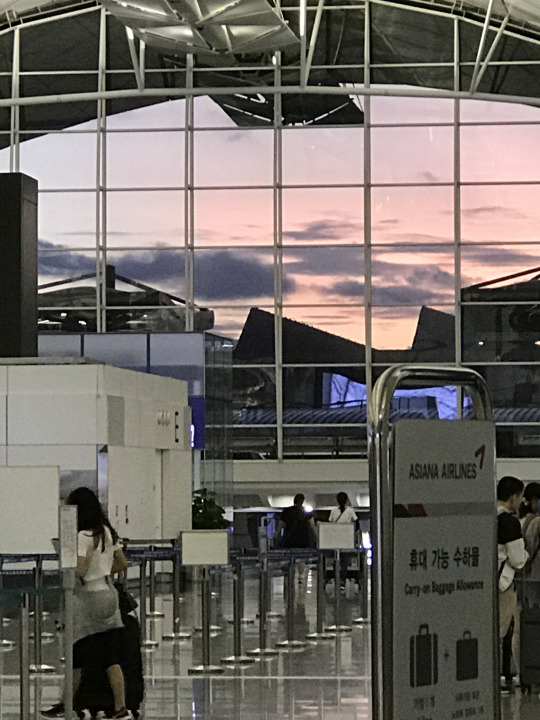
At daybreak, I'm back at the Hong Kong airport, which is pretty empty at this time, with most stories still closed. Outside daylight is soft, with tones of pink, orange, and grey, and the weather is quite pleasant. HKIA is well organized and well equipped. At a charging station, I do some work in my laptop and recharge all my batteries. After I'm done I look around and realize that the airport is full and every store is open. I finally buy a Hong Kong magnet and have breakfast at one of the food courts. Then I call my sister who keeps me company until the time of departure. I haven't slept in over twenty-four hours and I'm looking for a solid sixteen-hour flight. Perhaps I can finish Engleby...
As we board the plane I see a Buddhist monk. His haughty demeanor catches my attention. He is barefoot and carrying absolutely nothing, which is something unusual in an airport. Traveling with him is a man in regular Western clothes, carrying all the luggage. I wonder about the purpose of that. What's the spiritual goal of owing nothing, traveling light, if someone else will carry your stuff for you? But maybe my assumptions are all wrong and the guy in regular clothes is actually the big shot, carrying the other's heavy suitcase and documents in other to practice humility.
It could be.

As we wait for take-off I see in the distance a car going up a cable toward a mountain far away. It reminds me of Sugar Loaf in Rio de Janeiro and I'm filled with the desire to get to know Hong Kong better.
But not now. Now I'm homebound.
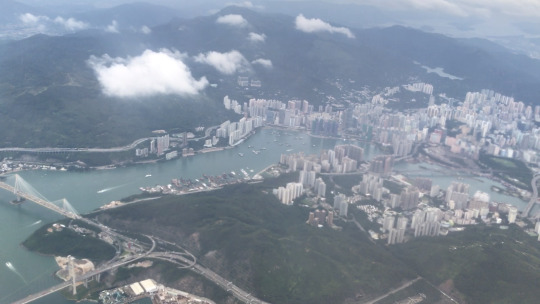
#mount holyoke college#francesperkins#Summer internship#Vietnam#thegioi#southeastasia#Travelblog#Adventure#hongkong#hkia#writerslife#authorlady#authorslife#studentlife#china#hong kong visa#chinesevisa
1 note
·
View note
Text
Tạm biệt, Hà Nội! Tạm biệt, Việt Nam!

I finish packing, look around for anything I might be forgetting, unplug my computer and cell phone, fully recharged, and pack these too. Thao and I have said goodbye the night before, but she texts me often to make sure I know which bus to take to the airport and to wish me a good trip back home.
Bus 86 stops in front of Melia Hotel, which is located about 7 minutes from where I live, but I need a little extra time since I'm burdened with luggage. I wait for about twenty minutes and pay the 30,000 VND fare, which is about $1.25. A great deal. It takes almost an hour to get to the airport.
What are my thoughts as I leave Hanoi? What do you think when you're leaving the greatest opportunity you have been given? I'm filled with gratitude. I remember the day I came and all I have learned, about the world, about this country and its people, about myself. There are a few phases in life when we learn a lot, such as in the first nine months in the womb or the first year of life. There are less intense phases but also of great impact when we go to school, when we go to college, when we become a parent... and when you go on an internship in a continent you have never been before. I can hardly put into words all I have learned, how richer this experience has made my life. This blog is an attempt to share this experience, but I know, it only does so much. My thoughts are scattered as I look out the bus window. One sight brings a memory, another brings a thought, a hope, a plan for the future. I hope I come back one day.
I hop out of the bus when I see the first airport, but that's a mistake because the first stop is a domestic airport. The driver tells me that, but I can hardly hear or understand what he's saying since I'm already outside. His assistant, in true Vietnamese fashion, hops out, grabs my luggage and points to the airport about 500 hundred feet ahead. Oh, yes, I remember now, that's Noi Bai International Airport! I get back on the bus.
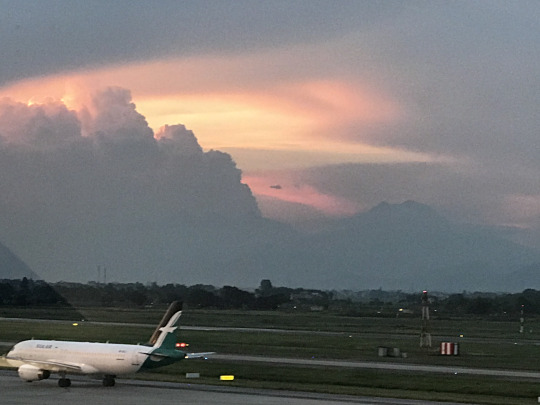
The airport is not too busy and I'm a little early. The check-in at the Cathay Pacific counter is fast and leaves me plenty of time to write, read and pray -- as I do before every trip. Some airports have prayer rooms, but I haven't seen one in Noi Bai. From Hanoi I'll fly to Hong Kong, where I have a very long layover. I'm trying to read but I'm very sleepy as I had a short night as usual. The flight has been delayed, but I won't sleep while waiting for fear of missing it. And, as it takes less than two hours from Hanoi to Hong Kong, I won't be sleeping much in the plane either. Outside the airport large windows, it's a gorgeous evening. I'm not the only who gets up and snaps a few pictures of this last evening in Hanoi.
Tạm biệt, Hà Nội! Tạm biệt, Việt Nam!
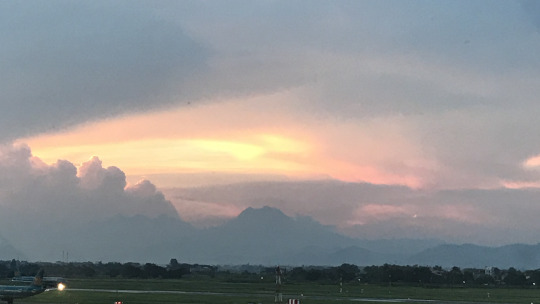
#mountholyokecollege#francesperkins#Summer internship#thegioi#studentlife#writer's life#southeastasia#Travelblog#Vietnam#Hanoi#noibaiairport#mywaybackhome#backtotheusa
0 notes
Text
The Things I Will Miss
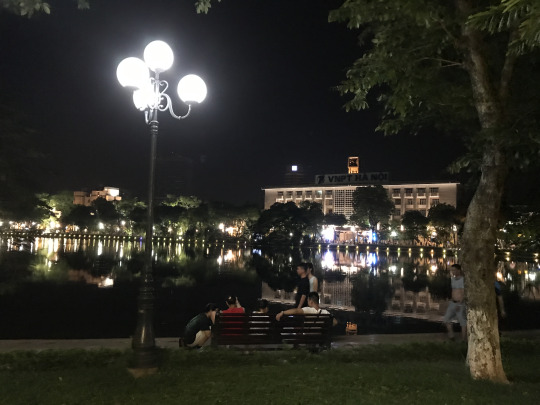
During my last lunch at The Gioi's cafeteria, my colleague Phuong asks me what I will miss most from Vietnam. I tell her I will definitely miss the time I have for myself. In Hanoi, my obligations are limited to work and self-care. No one needs me for a ride, to prepare a meal, or anything else. As any mother knows, time alone is something you give up when you have children. So, the last time I felt so free with my time I was single, living in my parents' house, in Brazil. Although in Hanoi I work forty hours a week, I still find time to explore the city, to write, to listen to music, to meditate and just be by myself.
However, that's more about own my own situation in Hanoi than about the Vietnamese culture. So, I have listed the things I shall miss from this wonderful country.
1) Safety. Nowhere have I felt as safe as I feel in Vietnam. Not in my neighborhood in Massachusetts, and definitely not in Brazil. In Vietnam, I can walk the streets at any time of day or night without a problem. I can take out my phone and take pictures without worrying that someone will snatch it from my hand. I can drop my bag on a seat or a bench in the park, and it won't be touched, unless someone thinks I'm forgetting it, in which case they'll go to great lengths to return it to me. I can count money openly on the street. In fact, vendors do that all the time, without a concern. Also, I love being in a country where guns aren't allowed on the public's hands. The United States has a lot to learn from Vietnam on the subject of public safety.
2) The Vietnamese lifestyle. The Vietnamese live outdoors and get plenty of exercise, without making a big deal out of it. You see very few gyms, for example. Physical exercise for the Vietnamese is like brushing teeth for Americans; something you do daily but nothing to brag about. You don't post on Instagram or update about your flossing habits on Facebook or Tweeter and you definitely don't take a selfie while doing it. Like Nike would have it, you just do it. Period.
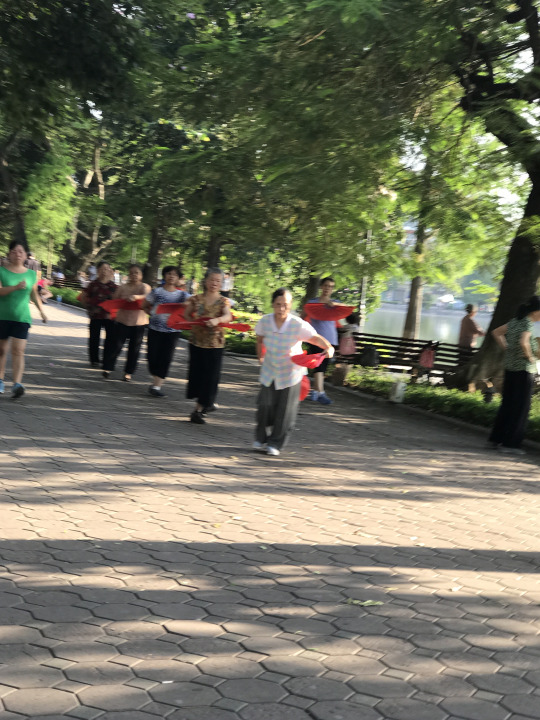
3) The Social Life. Like exercising, and often coupled with it, the Vietnamese get plenty of social interaction. It's that habit of living outdoors at which they are so adept. They work together -- in offices and rice paddies --, they play together, they exercise together even when choosing different workouts, they eat together and even nap together. Now, up to a point, Westerns do that too. But think of the guy at the gym, walking on a treadmill or pedaling on a stationary bike, with earbuds or perhaps attuned to the TV in front of him. Think of the woman in a spinning class or lifting weights in front of the mirror. Compare these scenarios with the guy teaching ballroom dance to anyone who comes by around the Ho Hoan Kiem or the group practicing Laughing Yoga, massaging each other's back at the end of each class. It's hard to tell whether they come out of their house for the exercise or to greet neighbors, friends and the occasional foreigner, but whichever the reason that brings them out, the fact is that the Vietnamese lifestyle promotes physical and emotional health. I do understand that the weather also plays a part in their activities, but I suspect that even during their coldest days, the Vietnamese find ways to see and talk with each other.
4) Fruits and Vegetables. It's not like I don't find these in the United States supermarkets. I do find plenty of apples, strawberries, bananas, etc.. But here I find guavas as big as American apples. I find mangoes and mangosteen. I find lychee and the freshest green tea. And here people seem to have a deeper appreciation for what the earth offers. Instead of processed or sugar-filled foods, the Vietnamese eat fruits for dessert and offer them at office meetings, to house guests and as a snack for children. I also love the habit of using peanuts in Vietnamese dishes. The Vietnamese do not eat as much processed food, dairy or sweets as Westerns do, and that alone explains why they don't have a problem with obesity as we do, especially in the United States.
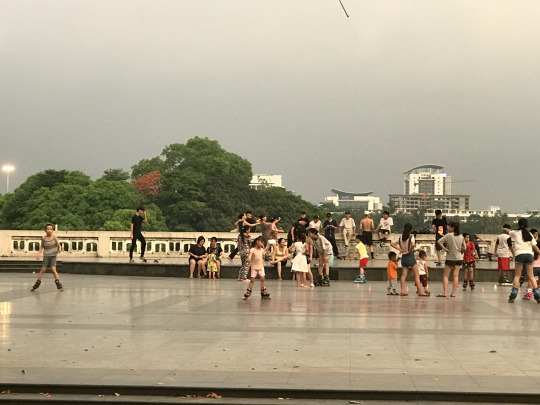
5) Liveliness. What at first seemed to me as chaotic, it's actually quite endearing; the fact that Hanoi doesn't sleep. "I find New York City boring," Lady told me while we rode from the airport to Old Quarter. I studied her face for sarcasm and found none. Now I understand what she means. Yes, New York City is the city that never sleeps, but it's a different kind of busyness. Elizabeth Gilbert, in her book Eat, Pray, Love talks about how each city has a verb, and the verb for NYC is "achieve". I can see that. And that's exactly what you see in the busyness of its residents. In Hanoi, however, this is energy is more organic as people are engaged in the business of living. And what would the verb for Hanoi be? Live, perhaps?
6) Cost of living. There are many Westerns tourists in Hanoi, more than I expected, but it shouldn't surprise me. The country is beautiful, people are friendly and the American dollar is worth a lot. Besides, things in Vietnam are inexpensive. A quick look at the prices on hotels.com shows that you can find lodging for $3 a night in Hanoi. The cheapest hotel in Augusta, Maine, where, let's face it, there isn't much happening, is $60. Three dollars in Hanoi covers a shared dorm in a hostel, and I would guess a pretty shabby one, but for half the amount of lodging in Augusta, you can be quite comfortable in Vietnam. Actually, hostels are a great business in all of Southeast Asia, which makes traveling so much easier and affordable!
I buy good food on the street -- street food in Hanoi is actually quite good -- for a dollar. Taxi, movie tickets, fruits, all that is inexpensive. Above all, I'll miss the great deals on airfare, especially those deals by national airlines.
7) Being Tall. On a personal note, I like the fact that, in Vietnam, I feel taller than I do in the West. I'm five-two, and that's short in the U.S., but in Hanoi, I'm taller than many women and even some men. It's a nice change.
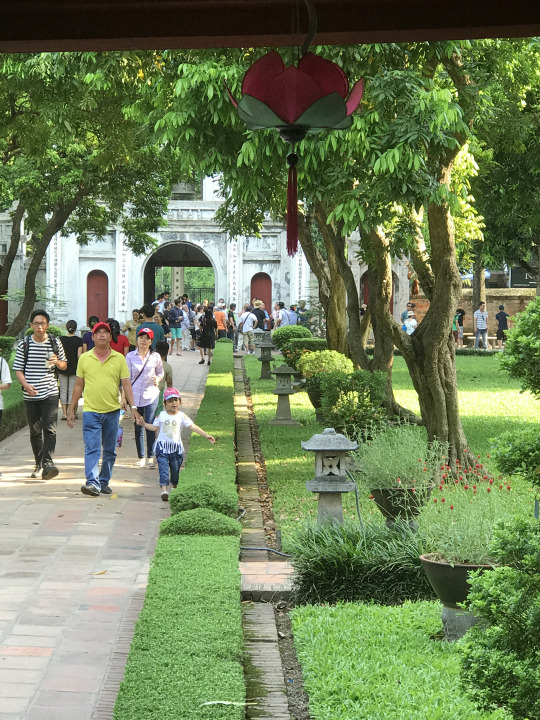
8) Nap Time. I am one of those people, like Winston Churchill, who loves naps. My favorite sleep schedule is a 6-hour night and a two-hour nap after lunch. When you wake up from a nap, it's like you're starting the day over. You have more energy and a fresher outlook on life. I feel like I give more of myself in the morning when I know that I'll have a chance to nap. If I have to go straight from morning to night, I conserve energy and perhaps don't take a walk or don't swim so that I won't be too tired to perform later obligations. On the other hand, when I know I'll have a chance to take a nap in the middle of the day, I give my all first thing in the morning, even if I have had very little sleep during the night, because I know I'll make it up in the afternoon.
Companies and schools should encourage their employees and students to take naps, as they would be more effective afterward and not slug through the afternoon, constantly checking the time, wishing to go home.
The Vietnamese are smart in that they understand this about human nature and work with it. At The Gioi we only have half an hour, but Thao tells me that at the TV station where she works they have two hours and a half to rest after lunch. But even half hour of shut-eye does a lot of good and I appreciate and look forward to that one pm when my supervisor closes the windows and turns off the lights in the office, and we all abandon our computers and close our eyes. Ahh!
9) The Vibe. This is a mixture of many things I have touched upon already, plus something else. You walk in the streets of Hanoi and you can feel the pulse of the city amidst the smells of a hundred different foods, the noises, and the motorbikes. It might be that nap the residents take in the middle of the day, but whether it's morning or night, the city is bursting with life. There's the food, which you find everywhere, the economy, which allows you to do more with your dollar, the weather that allows you to dress in shorts and t-shirt, the beautiful nature of beaches, parks, and lakes, the variety of sights and sounds and the diversity of the people. But besides all that, there's the Vietnamese joie de vivre. Vietnam has suffered in the hands of many foes, invaders who came stole, killed and subjugated the nation, of which the United States is only one of many. The Vietnamese are thriving now but they don't take anything for granted. It'd seem that it's still fresh in their memories how awful things can be. They thank often, smile easily, and stir clear from conflicts. They know how fragile peace is, and they enjoy it while it lasts.
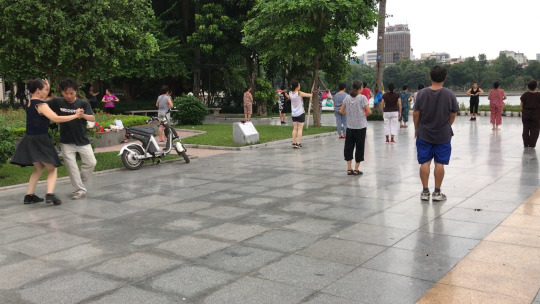
10) The Vietnamese People. I've deliberately left the best for last. I love the Vietnamese people! I love their respect and reverence, something I appreciate even more coming from the younger generation. The Vietnamese have the cute habit of handing your change with both hands, like an offer. I find that extremely charming. They're friendly and helpful, ready to lend a hand whenever you need. I've known them as bosses, colleagues, host, friends, and strangers. The general Vietnamese attitude is one of respect, consideration and polite curiosity. I've made friends and I will miss them, each one of them. I leave Vietnam feeling extremely grateful, especially to my supervisors at The Gioi and Lady, my guide and friend, and Thao who opened the doors of her home to me. I want you to know that I remember you all fondly, each one of you, I remember details such as your smiles, your words, and gestures. Above all, I remember your kindness.
Thank you!
#mountholyokecollege#summer internship#hanoi#vietnam#frances perkins#fps#studentslife#writerslife#liveliness#vietnamese#wanderlust#southeastasia#tenthings#social life#thevibe#naptime#respect#reverence#socialism
0 notes
Text
Ten Things I Won’t Miss
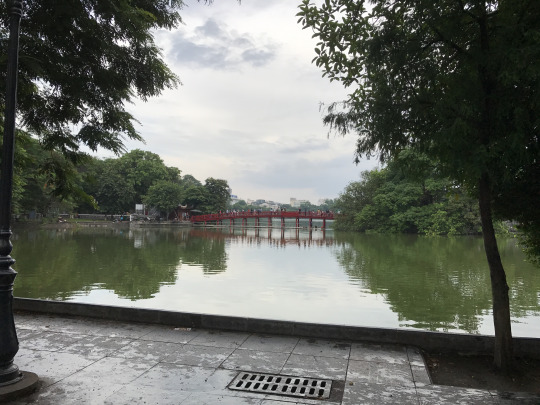
I take a walk around the Ho Hoan Kiem for the last time. It's been less than two months since I first set foot in Hanoi, and now I'm filled with nostalgia for the first days of my arrival when everything was a novelty. I've grown accustomed to the language, to street vendors, tourists, to scooters swerving around me, crowded streets and little shops. I can see why Lady came and stayed. It's easy to stay here. I shop for a few souvenirs then head to my favorite cafe in Hanoi; the Tous Les Jours! I take a seat on the second floor, open my laptop and work while having one of their delicious pineapple bread. The cafe has wi-fi and soothing golden lighting, while outside the window the blue sky gets darker with each passing minute. The soft music is perfect and the staff is super friendly. Today there are few customers besides me, and I appreciate that too. My only problem with the place, as well as most cafes in Southeast Asia, is that tea and coffee are served in such tiny cups. In South America is the same thing; you ask for a cup of coffee and get a little sample. They're rather proud of their coffee beans, but never want you to be satiated. Instead, they dispense it like medication. I miss the States' big mugs and free refills!
I'm at the end of my summer internship, and I've loved being here. However, there are a few things in Vietnam I will not miss. Let's make a quick list, shall we?
1) Probably the number one thing that really gets to me is the habit the Vietnamese have of clearing their throats and spitting on the ground. This happens everywhere. You're walking around the beautiful Ho Hoan Kiem lake, having the best thoughts conceivable to men, then you hear someone right beside you making a deep sweep in their throat and spitting its phlegmatic contents right on the path. Gosh! I do avert my eyes, my ears, and all my senses as I find the habit deeply repulsive, but this seems perfectly normal and acceptable in the Vietnamese culture. I want to ask them if you have to do that, can you at least spit in the nearest trash can?
Close related to that is their habit of picking their noses. It's not that people all around the world doesn't do it, but there's a time and place for everything, which is a concept that evades the average Vietnamese. Also, consider dropping the habit altogether and using a tissue instead.
2) Poor sanitation. This is both a personal issue and a major social one. I believe many people wouldn't want to visit Southeast Asia because they don't do well with a hole in the ground instead of a toilet bowl. So, yes, my travels would have been much more pleasant if I could count on proper sanitation, but I also believe that these countries could get a major boost in tourism, and consequently in the economy if they just made sure that public restrooms were properly equipped and clean.
3) Cutting in line. This only happens when you're in line, so, it's not a constant pebble in my shoe, but when it does occur, it's unbelievably annoying. How can anyone think that this is okay? How do they feel when someone cuts in line in front of them? I have talked to Vietnamese people about that and they laugh like it's a Vietnamese cute quirk. It's not cute! A quirk shouldn't interfere with everyone else's schedule. It's not that Vietnamese people are arrogant, because generally, they are not. It's just that they don't put that much stock in this kind of social organization. On this matter, China is quite different. Even by visiting the Chinese embassy in Hanoi one notices that cutting in line is a major no-no. Chinese people can be very rigid on a lot of things, not always sensibly, but in queueing they can teach Vietnam a thing or two.
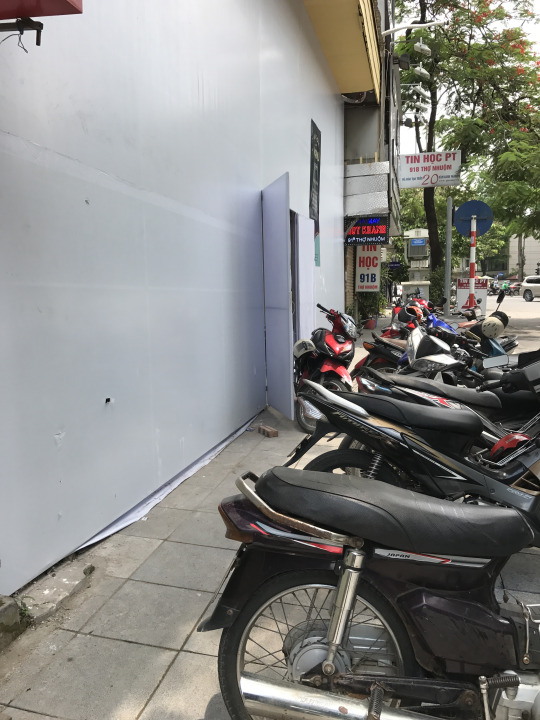
4) No sidewalk to speak of. Well, yes, there are sidewalks, but they're not for walking. They're used primarily as parking spaces for scooters. If there aren't parked scooters, or if there's extra space, then people may walk. But most likely, it's been already taken by tables and people cooking, eating, playing checkers, or fixing appliances. If you're walking on the sidewalk at rush hour, remember that the sidewalk is free game, and you'll most often see a motorcycle rushing at or behind you. The fun never stops.
5) Smoking. This is something that surprised me. I thought that smoking was in decline all around the world, but apparently, that's not the case in Vietnam -- especially among young people. The Vietnamese young men and women seem unmoved by the disturbing ads on cigarette packages. Everywhere you go, there are people puffing away. What I find ironic is that most people use a mask on the streets to prevent contamination by air pollution but see no problem in lighting a cigarette.
6) Trash. Sometimes I think of Vietnam as a person with low self-esteem, who just doesn't realize his potential and how precious he is. That would explain why they don't care much about some of their beautiful beaches and parks. That's not generalized, and Hanoi has many places well cared for, but in a beautiful beach in Phu Quoc, for example, there was plenty of trash, so that you had to watch where you stepped. The rule of thumb seems to be that, unless a place is considered sacred, like a pagoda, or classified by UNESCO as a World Heritage Site, it doesn't require maintenance. Therefore, if you visit the Temple of Literature, for example, you'll find it clean and well maintained, but if you take a walk around a small park or lake, it might be littered with empty bottles, food wraps, and dog feces.
7) Toothpicking. After a meal, most people in Vietnam reach for the toothpick -- which is conveniently placed on the table -- to do some teeth cleaning. Okay, this is a personal peeve of mine. As a teenager, I worked as a dental assistant and that was something my boss hammered in his clients' minds; don't use toothpicks on your teeth, it does more harm than good. The Carefree Dental site has the following to say about the habit: "...if you're not careful, you could be damaging your tooth enamel, lacerating gum tissue, and even causing a broken tooth... Additionally, aggressive toothpick use could damage the roots of the teeth, especially where the gums have pulled away from the teeth leaving root surfaces exposed. A broken splinter could also lodge itself in the gum, resulting in an infection if not removed." I understand the drive to get food from between your teeth after a meal, but there are other ways, more effective, to do that, like flossing. I also don't like the fact that this is done at the table, but that might just be me. I'm one of those people who believe that a restroom is a perfect place to put yourself back to rights. Especially if that restroom is well lit, has all the appliances and is clean. #see sanitation above.
Vietnamese people are notorious for bad teeth and oral hygiene, and I believe that toothpicking is only one more bad habit in a multifaceted issue.
https://www.carefreedental.com/resources/16-dental-tips/153-10-bad-habits-that-are-hard-on-your-teeth
8) Unwelcome solicitation. Vietnamese people are very helpful and most of the time their help is quite welcome. However, it can get annoying when you can't take a ten-minute walk without being offered at least five things. It's fruits, hats, juices, food and, of course, rides. There's a man leaning on a motorcycle at almost every corner, and every one of them asks if you want a ride. That's also the case in Cambodia, Thailand, and Laos. It's nice to have rides easily available, but it becomes a pain when you can't go twenty steps without having to decline something. There are also those who follow you for a little while, insisting.
If you do accept whatever they're selling, be ready to haggle. Sometimes haggling is fun, especially if you're doing it for exercise and are not very interested in the product. But in that case, I'd rather spend my time in more interesting conversations. When making purchases, I like straight-forward transactions. I prefer fixed prices and being able to count on finding the same product at the same price day after day.
9) Scarcity mentality. The scarcity mentality is the idea that there's never enough to go around. I use the word never instead of not, because the scarcity mentality subscribes to a sort of pessimism. It's not that there isn't enough for today, but a constant belief that tomorrow there won't be enough either. Some people with this mindset are very selfish, believing that resources cannot be shared since more for you means less for me. I'd not say that the Vietnamese is selfish, much on the contrary. The people I met in Vietnam were very considerate and extremely generous, especially my supervisors and colleagues at The Gioi. However, the notion of poverty is very present in the Vietnamese society's words and actions. This is hard to explain, so I'll give a few examples: the tiny teacup at homes and cafes, as I've mentioned before, the scant toilet paper, narrow streets, tiny bathrooms, little water in the shower, bath towel about the size of an American hand towel, recycled water for many needs like washing dishes, flushing, etc. Anyone who knows me knows that I dislike waste and truly believe we should use our resources more effectively. My problem is with the mentality itself, with the belief that we don't have enough, the posture that everything is scarce today and tomorrow will be worse. While I can't speak much about the economy in Vietnam, I do notice that people have money to eat out, to buy cigarettes, to go to the movies, and to travel. And yet, that cultural restriction is often present, as though the resources are meager and must be carefully divided.
I have often compared Vietnam with Brazil, and on this too the similarity is astonishing. I was away from Brazil for twenty-four years, and at my return, I was surprised by the size of things like soap bars, peanut butter jars, mayonnaise, jam, tomato sauce, shampoo bottles, and of course, teacups! Do people eat or use less of a product because it's in a smaller package? Or do we use or eat as much as we need, independent of the container? Like Vietnam, Brazil also keeps and encourages a scarcity mentality. In a culture with this mindset, goods are distributed as though from a parent to a child -- this is all you can have, Junior, so make sure it lasts, -- while in places with an abundance mentality, goods are spread freely, even if they are meager, with the trust that people will responsibly take what they need and nothing more. In this case, people are treated like responsible adults and not like children who can't be trusted.
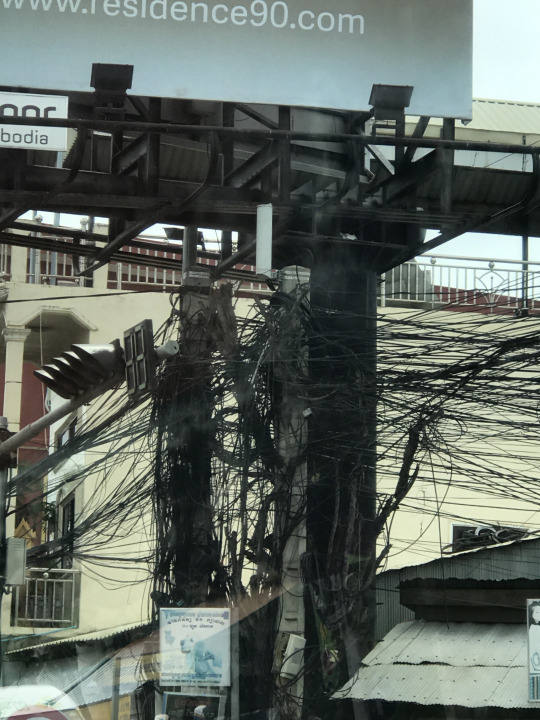
10) Order and Progress. It could be the slogan on a flag, right? Oh, wait! It is! It's the slogan on the Brazilian flag. And it doesn't work very well over there. But, disappointment notwithstanding, it's a good slogan. No. It's a great slogan because you really can't have progress without order. I'm sure if one day Brazil succeeds in attaining the first part of the slogan, the country will have no problem with the second. Order, or organization, allows us to take a full assessment of our surroundings. It's by organizing that we know the resources we have and can plan around what we don't have. While traveling in Southeast Asia I noticed that the absence of some basic structures -- sanitation, for example -- is not the result of lack of resources. Everything necessary for an efficient and pleasant rest stop, for instance, is already there. The electrical wires in Phnom Penh is an example of that; apparently, the Cambodian capital expanded quickly and there was an immediate need for more and better electrical wires. Instead of organizing and extending the existing cables, they haphazardly added more as demand increased so that now it's a tangle of wires which defy logic. I can only imagine how electricians deal with that mess.
So, why can't it be organized? I don't know. Perhaps they have been dealing with bigger emergencies, putting out fires for too long, or maybe order is just not a high priority in the Vietnamese culture. However, there are places where much thought and planning have been applied, like the Train Tien Plaza in Hanoi, a shopping center with all the organization and sophistication one can expect. The airport, some hotels, stores and upscale restaurants show a stark difference to the facilities for the public, which have yet to benefit from the same kind of organization.
#mountholyokecollege#Summer internship#Hanoi#vietnamese#southeastasia#studentslife#writer's life#traveling#travelblog#toothpicking#scarcitymentality#queueing#nose picking#francesperkins
1 note
·
View note
Text
Hỏa Lò Prison
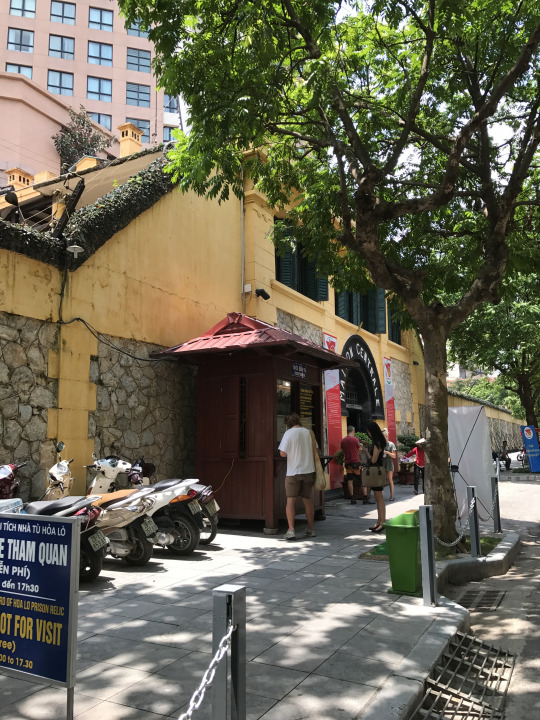
This is my last day in Hanoi and I've decided to work until noon since I'm still trying to finish some work before leaving. I have said goodbye to Thao the night before, and we promised to keep in touch. I invite her to visit me in the U.S. and she hopes one day to be able to go but makes no promises. She has decided to return the house to the landlord. He has already rented it to a family who felt at liberty to bring "a few things" earlier since the day was considered auspicious in some ritual. The "few things" take most of the space in the house. I'm annoyed by their lack of consideration for the people still in the house, but Thao just shakes her head and laughs.
The Gioi office is empty today because my supervisors and some of the interns are attending a literary event. I'm happy Phuong, one of the interns, is still there because she is a lot of fun to have around. She goes around with a cloud over her head -- seriously, rain seems to follow this girl everywhere she goes -- but she can afford it, because she's sunshine itself, always smiling and enthusiastic, even when she complains of how sleepy she is. Since Abby left, she has been my tea companion. At lunchtime, there's just the two of us at our regular table. We always have something to talk about and today is no different. Phuong is less than half my age, and yet, we share many interests and opinions.
After lunch, I train tai chi on top of the building, a nice place where one of the supervisors likes to train in the morning, but haven't done so lately, because of the unbearable heat. Today is as hot as ever, but I have wanted to train here since my first day at The Gioi, so I take off my shoes and burn the soles of my feet as I train the simplified Yang form while Phuong registers the moment.

I leave the office soon after noon and walk down Tran Hung Dao in direction of the Hỏa Lò Prison, aka "Hell's Hole". My friend Anush has told me about it and I don't want to leave Hanoi without visiting this historic site. This is the place where Vietnamese revolutionaries were held captive during the Indochina War and also where some American soldiers were incarcerated during the Vietnam War (American War, as it's known in Vietnam). Anush has studied criminal law and visited many prisons around the world. On her living room wall, she has a picture of herself behind bars where Nelson Mandela was imprisoned. And that's not the only one. She has stayed in prisons/turned hotels all over the world and tells me that most of them are quite comfortable. However, Anush is not a usual woman and maybe prisons are not high on most tourists' lists of places to see, but Hoa Lo is quite popular. Tourists speaking English, French and perhaps German leave the sweltering Hanoian sun outside and file through the gates into the coolness of the prison.
Aside from the historical value of this place, I find my visit extremely educational. How different are we now than at the time we punished people as depicted in this museum? Are we different at all? What would I see in a Guantanamo Bay museum?
The outside walls are yellow, almost cheerfully so. Inside, though, walls and mood are somber. In the TV room, you can sit in the air-conditioned environment and watch footage of the war. The exhibit feels like a hard look in the mirror. Humans. What kind of animals are we, that we can justify torture and cruelty to another of our species, and sometimes even glorify these actions with medals and parades?
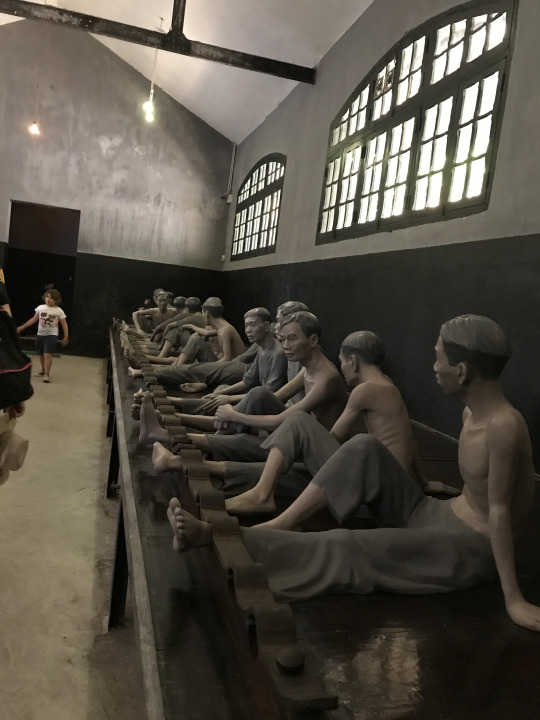
Some sights are especially disturbing, such as the large room with all the statues of prisoners, on whose faces you can see terror and despair. If you study their faces you can distinguish those who are still determined to fight from the ones who have given up all hope. Another room was used for mothers and their children. It's a rather touching sight the statues of imprisoned women caring for their young. Suffering, pain, fear, anger, love, and tenderness are some of the emotions evident on their faces. Once you contemplate them you can't turn away. You're led to imagine what went on within these walls; what went on in the country at this time, that throwing someone in prison like this was a frequent and acceptable thing to do.

As if these quarters weren't depressing enough, there is the dungeon, where the misbehaving prisoners were thrown. One look inside it and my whole body feel like imploding. Albert Einstein said human stupidity is limitless. Maybe human cruelty is also limitless, especially when justified by fear and self-righteousness.
I end my tour at the souvenir shop where I find a book by my guide into Vietnam, historian and author Lady Borton. The more I know of her work and personality, the more I admire her. As I pause to check her book, I'm honored and grateful for her friendship.

Back in the streets the blinding sun and intense heat bring me back to the present and my own circumstances. I hasten my step, for I have just enough time to go home, finish packing, and walk to the bus stop, on my way to the airport.
#Vietnam#traveling#writer's life#studentlife#Summer internship#mountholyokecollege#francesperkins#hoaloprison#Hanoi#taichi#authorlady#ladyborton
2 notes
·
View notes
Text
Saying Goodbye

There are still many things I want to do before leaving Hanoi. Some of them are work-related; files I want to finish editing and articles I need to write at The Gioi. There are also places and people I want to see. Stephane, our roommate, has found a better living arrangement, so he's no longer our roommate, but still a friend. Thao and I arrange to meet him at the Chay Anlac, the vegan restaurant where I went with my The Gioi colleagues, a generous offer from our supervisor. Neither Stephane nor Thao have ever been to the Chay Anlac and I'm happy to introduce them to a good vegan restaurant. I hope they like it.
We eat, we talk, and we laugh a lot. We're in good spirits. Language is always a topic of conversation since we're a group made of a Vietnamese, a French and a Brazilian, and we talk in our second language, which is English. Stéphane is self-conscious about his English, but he speaks better than I do French, so we usually talk in English, although sometimes, when the topic becomes more personal or philosophic, he jumps to French. Sometimes I understand him better in French than in English. Thao's English is pretty good but she doesn't speak French. Stéphane, who's in Vietnam for good, is taking classes in Vietnamese and speaks much better than I do.
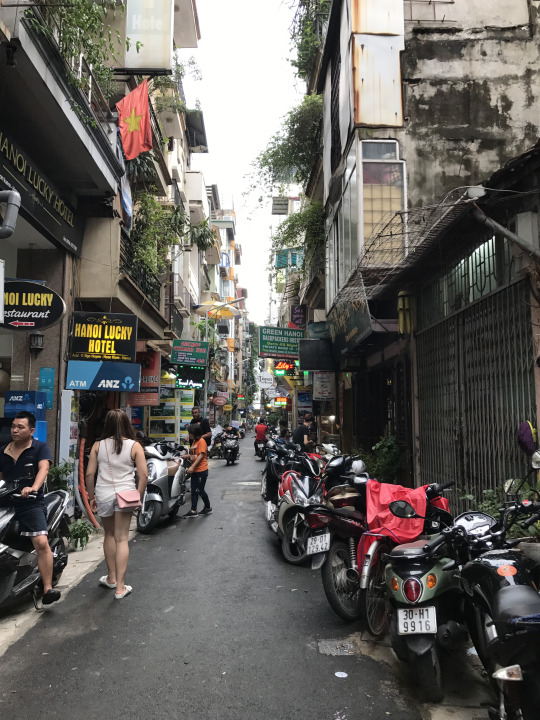
After dinner, we ride to Ho Hoan Kiem for a walk. Once there, the subject turns to fruits, comparing them from country to country. Take apples, for example. You'll find apples grown in Vietnam, but they're tiny. However, their taste is much more accentuated. I wonder about that; some smaller fruits, such as Hess avocado, has a stronger taste than the bigger kind. Do I see a pattern here? Do smaller fruits have a stronger flavor than big ones? If I think of the same fruit, and compare just by size, this holds true. But if I compare different fruits, it doesn't. Yes, a strawberry or blueberry has a stronger taste than watermelon, but pineapples are big and their taste is pretty strong.
What about people? Are shorter people more passionate than taller people? Before disregarding the topic as irrelevant speculation, think of the case of extremely tall people who have short lives because their heart gives out. Think also of short people who are firecrackers, have endless energy and live forever. That would be an interesting study. And what about ethnicity? Do tall people in Japan share the same characteristics as tall people in Germany or the United States?
But tonight, enjoying an ice cream by the lake, we don't get into the issue too deeply. We laugh at language differences and the mistakes we make. We joke about meeting again in the U.S. or perhaps in France. I don't quite believe in coincidences, so I wonder why we have boarded together. I, for one, feel lucky to have met Thao and Stephane. I ask Stéphane what he misses most from France and, without hesitation, he answers "my mother!" Then he laughs and says he's joking, though he doesn't say anything else he misses. He seems quite happy in Hanoi. So am I, but all good things must come to an end and in two days I'll be going back home. When we ride home it's already late. We hug goodbye and vow to keep in touch.
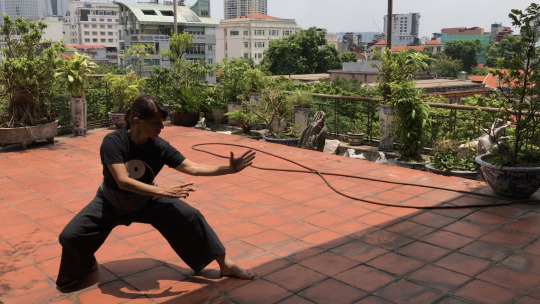
The following day is my last at The Gioi and I want to take a picture with my colleagues. We eat lunch in the cafeteria, as usual. There's much I want to say to the ladies who cook and serve the food, but all I can say in Vietnamese is cảm ơn bạn, delivered with such a heavy accent that I have to repeat it a few times for them to know that I'm thanking them and not choking on my food. After lunch, I stand on top of the building with both supervisors and two young interns and snap a few pictures. One of my supervisors gives me a tea container as a parting gift. He asks me if I'm coming back next summer, I tell him I really hope to return one day, but at this moment, there's much about my future I don't know.
But then again, does anyone know their future?
#vietnam#traveling#writerslife#studentlife#mountholyokecollege#summer internship#thegioi#francesperkins#veganrestaurant#hoan kiem
0 notes
Text
"I Describe Him, So That I Won't Forget."
(from The Little Prince, by Saint Exupery)
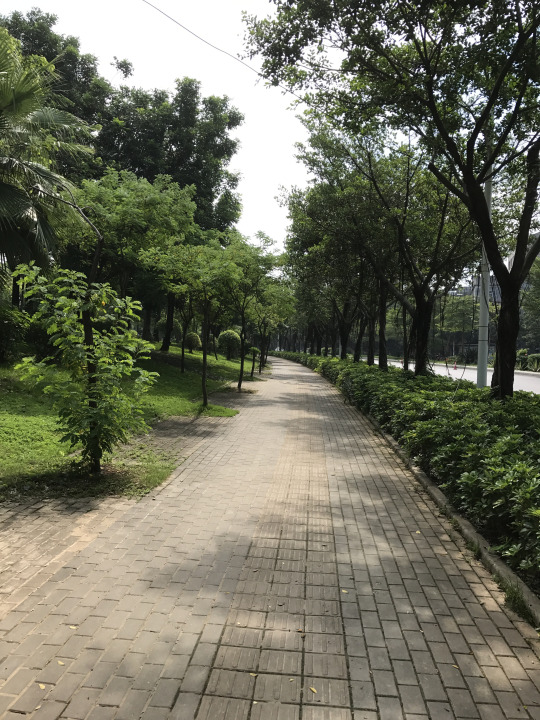
I fell in love in China.
What is love? And what does it mean to fall in love?
Only in Hollywood movies does falling in love mean finding that one person who will erase your past and brighten your future forever. On this side of the screen, falling in love happens often, with a place, a book, a song, with a person, and often this person is ourselves. For the purpose of this post, love is what happens when our souls touch another's. In this particular case it's neither romantic nor physical, and maybe that just makes it more precious. Perhaps to fall in love is just leaning our candle into the flame of another, and relighting both. After such encounter, I'm bursting with passion for life and I hope the other is as well, or at least, that I didn't diminish his light. Let me start from the beginning...
I sleep like a baby in Nanning. The bed is comfortable, the temperature perfect, and so is the morning light coming from the window. I lazily stretch myself and reach for my cell phone to check the time. I am hoping to see 7 or 8 o'clock on the screen but to my surprise, it's past ten. I stretch a little more while calculating the time I have been asleep. About eight hours! That's unusual for me. I pat myself on the back -- figuratively --, get up and into my Tai Chi uniform because I have trained the martial art for almost thirty years but never in its birthplace and won't miss it for the world. I leave the hotel and walk toward the park near Yonghe Bridge.
It's hot and I'm looking for a cool and quiet place when I spot a man and a boy of about fifteen training a staff sequence. I immediately recognize it as the one from my training days in Brazil. I approach them. Standing nearby is a girl of perhaps thirteen. She notices me right away but the boy and his teacher are completely engrossed in their training. The student makes a few mistakes, which the teacher readily corrects and explains the movement further. Of course, I don't understand a word he says, but his gestures are clear enough.
I ask the girl if she speaks English and she nods shyly. "Can you ask them (teacher and student) if I can take pictures?" On the first opportunity, she relates my question to the teacher. He regards me for a moment and says it's okay. I ask him -- through her -- if he trains Tai Chi, and he says no, that he only trains Shaolin. I ask if I can join their training and he says I can. We train the part of a sequence I know well, and had I known any Chinese I would have told him so. He does know that I'm a fellow practitioner, but the language barrier prevents us to talk details. That's fine, as Tai Chi -- or Shaolin -- requires little talk.
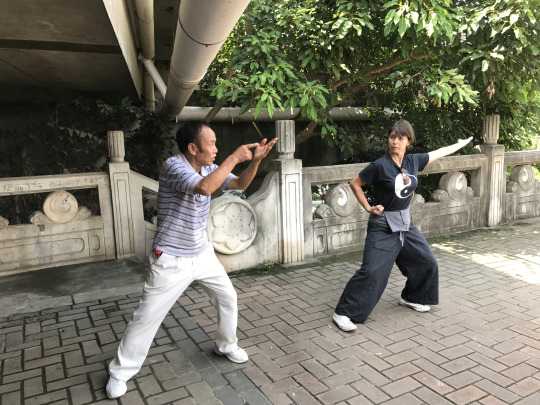
After about an hour of class, he asks his female student to translate what he wants to tell me. Through her, he invites me to come the next day to train with him. He wants me to know that he is there every day at that same time and that I can come and train with him every day. I'm touched by his generosity, but I tell him that I'm just visiting and will be departing Nanning soon. In fact, I have to get back to the hotel and check out in a few minutes. We take a few pictures together and the teacher asks the girl to take down my name and my contact information. We don't have pens or paper and since it's China, she doesn't have Facebook, but she does have Instagram, and she tries to memorize my name. It's a long shot, but it's all we've got.
I leave the hotel soon after noon and walk toward the train station, to look for the office holding my ticket back to Hanoi. It's hot and my bag is heavy but the walk allows me to see much of Nanning. It's a busy, well-developed and well organized city, famous for its many parks. I see a Walmart store on my way but have no wish to stop. After about seventy minutes I start recognizing streets and sights as I approach the train station. That's where I should be, but I can't find the address. I ask the locals, show the address in Chinese to many people, and they point me in the direction of their best guesses, but the actual place eludes me. If the information I'm getting is at all reliable, I'm getting closer to the office with each step, though no one can tell me exactly where it's located.
Two girls of about eighteen take it upon themselves to help me find it. They both speak a little English. They have two umbrellas to protect them from the sun and insist I take one. They ask me if I have eaten lunch and when I say no they become concerned. I don't tell them that I also didn't have breakfast and, to be perfectly honest, I didn't quite remember the last time I had a full meal. They think I should halt my quest and have something to eat immediately. They ask me if I have money for food. I tell them I do but I don't want to stop to eat before I have the ticket in my hands.

We walk in search of the address. I can't understand how a place can be so hard to find, but it is. The girls recruit the help of other people, just like I did before, and they all point to a similar direction. The moment of relief comes when, at my request, they call the office and are told that yes, they are open and my ticket is there, waiting for me. The girls walk with me, but I feel like we're walking in circles. They think we should take a taxi because it's too hot and it seems far. I have already walked for over an hour from the hotel, and this is perhaps ten minutes more, so I don't see the point of taking a taxi.
We stop at a corner, and they're confused but I have an inkling of the way, which seems to be opposite to where they think it is. And then I see him, the tuk-tuk driver from the day before! The girls ask him directions and he says it's kinda far but he'll take me there for ten yuan. I tell him no, thank you very much. Fool me once, shame on you, fool me twice, shame on me. That's a shame I can prevent from happening. I return the umbrella to the girls, thank them for their time and tell them I'll find it by myself.
I walk for about ten minutes or so until I find myself near a couple of buildings that just might be it. True, I have had this hope before but that's the thing about hope; it springs up again and again, even in the least promising situations. At one of the buildings, I ask a porter if he can use his cell phone to contact the office. He kindly obliges. With the guy from the office on the line, giving him step-by-step directions, we walk around a block and, after a while, find the rather obscure entrance B on the back of the building. I'm deeply grateful to my helper, without whom I could have never found it. After thanking him, I go up to the 17th floor.
The door of room number 17 opens into a large space with a few desks. There's only one guy hiding behind a computer screen. As soon as he sees me he gets up and gives me the ticket. That's it! All that worry and hours looking for this office for the ticket now in my hand. I let out a sigh of exhaustion and relief. "Mind if I sit down for a moment?" He doesn't. He points to the water cooler, in case I'm thirsty. His English is limited but I assume he understands much more than he speaks since I've been communicating with him through email for a while. As I rest I notice a door leading to a bedroom and a bathroom. I assume this is probably his home. The bathroom is the kind I've seen in some places in Vietnam, with a hole in the ground and only the very basic features. I think of the ticket in my hand and I wonder whether it's legit. It looks exactly like the one I bought in Hanoi, which was the real thing. So I decide to trust that this is a small, but genuine business.
My train doesn't leave until 6 p.m. and I still want to do two things in Nanning; have a late lunch and buy a fridge magnet. The restaurant where I stop could as well be located in Astoria, NY. It's a place like the many popular Chinese restaurants in the States. But here it's harder to order than in New York. The lady behind the counter can't understand me and I, of course, can't understand her. But we do want to understand each other because I'm hungry and she wants to sell. I'm pointing at the pictures of rice and vegetables. However, these are two dishes, and do I want two dishes? No, I don't. I try telling her that I don't want meat of any kind.
"I can help," says someone behind us. A wave of relief washes over me as I turn to look at the speaker; a young man with a red t-shirt and an open face. "I can help," he repeats.
Through him, I order noodles with vegetables. His willingness to help is infinite but his English is not. We struggle to understand each other as he relates to me the lady's questions. Do I eat eggs? No. But there's egg in the pasta. I relent, fine, a little egg in the pasta won't kill me.
My young friend asks to sit with me. He has just finished eating at another table but comes to mine and tells me that he's thrilled to meet me. I'm the first foreigner he has ever met! His friend won't believe it. Do I mind if he takes a picture with me? No, I don't mind. I'm happy to make his acquaintance and I too want a selfie with him. My food comes and I realize that the egg was not in the making of the pasta as I thought but added to the dish. And for vegetables, there are only a few leaves of cabbage. I have tasted better "Chinese food" in the restaurants around my house. I especially miss The Great Mandarin in Woburn, Gung Ho in Ludlow and Wong Wok in Springfield, but hey, this is the authentic Chinese food!
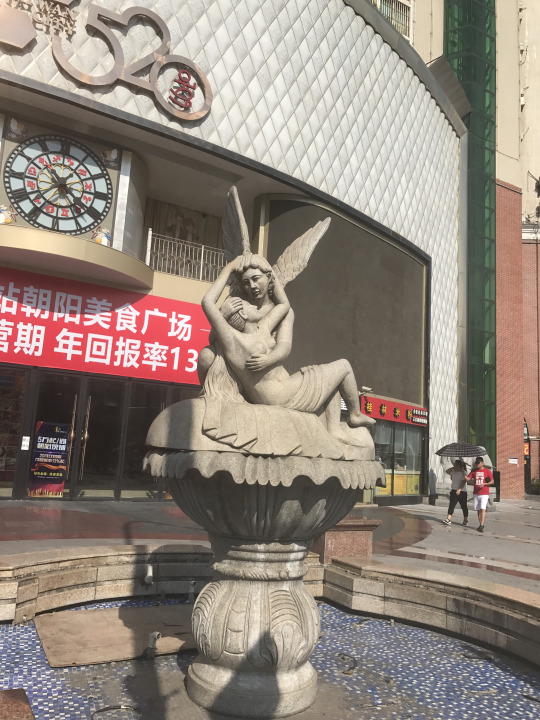
However, in no restaurant in the States would I have found my new friend Juan. (That's not his actual name but it's my best pronunciation of a rather long and difficult Chinese name for someone who doesn't speak the language. But since Duolingo has just added Chinese, things might change.) As I eat, I learn a few things about Juan. He's not from Nanning and in fact, knows few people in town. He has one friend, to whom he has just sent our picture. He is here for the summer to work. Soon he will have to go back to his home to continue his studies. He asks me a bunch of questions, where I'm from and what do I do in my country. I show him pictures of my three grown children. He is twenty years old, the same age as my youngest son and his birthday is Christmas Eve.
I tell him that I'm looking for fridge magnets. He doesn't know what I'm talking about, but since the restaurant has wi-fi I can look online for pictures to show him what I mean. However, I'm stuck with Bing since this is China, and Google is not allowed here. (Please let's all take a moment for a collective eye-roll. C'mon, China!) Bing gives me pitiful images of magnets, but it's enough for Juan to know what I'm looking for. He has never seen them, though. I tell him they're most likely sold in places where you find things like maps and souvenirs. He shakes his head, he has never seen them or any stores selling souvenirs in Nanning, for that matter. He apologizes for not being able to help but then thinks of his friend, who just might know. He texts him and his friend tells him that Nanning, not being a touristic destination, doesn't have this kind of store. I decide I'll try my luck anyway.
As soon as I push my plate away he asks, "are you ready?" I'm surprised to see him get to his feet and pick up his backpack but it soon becomes clear that he intends to help me look for magnets.
It's incredibly hot and humid as we walk around the city, checking every little shop for magnets. In Phnom Penh, I found magnets in the back of a little shop near the Wat Phnom, and in Bangkok, I found them on the table of a street vendor, both places that could easily have gone unnoticed. My point is, fridge magnets are sold anywhere, and if you don't look well, you miss them completely. My friend, however, is more direct in his search. He's looking for a souvenir store. I stop to look at this and that store but he shakes his head, no, you won't find it in there. Even though he is shy, I urge him to ask salespeople if they have magnets, which he does.
We talk as we walk. He's an only child, of course, since he was born during the Chinese one-child policy. He likes to study but resents the fact that school takes all his time and he cannot play any sports. He'd love to play baseball but that's an impossible dream. He has to study.
His friend texts him about a department store in the city's center where we might find magnets. Walking there I see some of the almost 7 million residents of Nanning. The place is big and busy. There are hundreds of little shops, most of them selling clothes. We quickly scan them, and, not finding magnets, we move on. He points ahead, to where the department store is located. It's a tall building amidst small shops, as though an organic growth from the agglomeration of shops surrounding it. The streets are packed with shoppers, entering and leaving stores. Toys, clothes, flashlights, and baseball hats are being sold everywhere, but we can't find one magnet.
We have been walking for a while now, sometimes in silence, partners on a quest, sometimes exchanging basic information about ourselves. As we approach the department store I check the time. It's three minutes to five o'clock. "I think I should get back to the train station," I tell Juan.
"What time does your train leave?"
"Six o'clock."
"We have to take a taxi."
I think it unnecessary but Juan says we're too far and there's no way we can make it on foot. I acquiesce and he quickly hails a cab. As we ride to the train station I can appreciate just how far we have walked. Traffic is heavy, the streets are wide and as organized as any big American city at rush hour. Unlike Hanoians, the Chinese obey traffic regulations and motorcycles do not drive on sidewalks.
Juan apologizes for not finding the magnet. I tell him it's okay. He texts his friend and chats with the taxi driver. "Do you have ten minutes?" He asks me. I'm not sure I do since I can't calculate how far I'm from the station. Juan tells me that the driver knows a place where they sell souvenirs. Would I like to go there? "Sure." He tells the driver, who quickly veers the car into a street then immediately stops at a traffic light. I think I have just made a big mistake. I'm wondering how I'll tell this story months from now, about the time I went to China and missed my train because I was trying to find a fridge magnet. I decide it'll give the magnet a special meaning, but I don't know how I'll manage from today to one month from now. I'm reminded of the time my son Marcelo went to Liverpool. He was visiting the house where John Lennon used to live, aware of the limited time he had there when he saw a sign announcing that McCartney's house was close by. He considered the time he had before his train left the station and made a bold decision; he chose to risk missing the train to see Paul's house. After visiting it, he had to run all the way to the train station. But he did get there in time and was happy to have made the right call. That could happen to me today. Or... I could be making a big mistake.
The cab stops. The driver points to a place and explains something to Juan, who tells me that from there we can take a shortcut on foot to the station. I don't see the station and I'm afraid my situation is hopeless. Juan quickly pays the driver ten Yuan and we ran to a market that sells crafts, but most of the booths are already closed. Only two are still open but there's nobody to wait on us or answer questions. We take a look around but there's nothing remotely resembling a fridge magnet.
So we leave the market and head to the station. I expect Juan will just point me in the right direction but he's by my side, running with me, in the hot and muggy Nanning weather. I realize that this guy has spent his only day off trying to help me. I know where the station is, I can see it far ahead, but still, he is sweating beside me as we run. We no longer talk, we barely look at each other, but the red blur of his shirt is a constant comfort beside me. I want to tell him that he has done enough. I want to pay him back for the taxi because he's in Nanning to work and save for his studies. I want to tell him just how much I appreciate his company and that, even though we didn't find the magnet, I'm happy to have made his acquaintance. But I can't afford to stop since every passing second increases the likelihood that I'll miss my train.
Finally, we're at the station. It is big enough that from the gates you don't see the trains coming and going. I have no idea of the time and I'm afraid to stop to look. I just want to go in and try my luck.
At the gate, the guard asks for my ticket, and I quickly pull it from my bag. He takes a look at it and lets me pass. As soon as I step on the other side, I realize that Juan cannot pass, since he doesn't have a ticket. I look back and see him watching me from the other side, his face red and sweaty, his breathing hard, looking utterly bereft. I immediately turn around, cross the gate without asking permission and throw my arms around Juan's neck. "Thank you so much for your help!" I say. He's startled at first but holds me for a moment, before I pull away and dash through the gate again. I look back one more time to wave goodbye, and of course, he's still there.
As I run to the right platform I see the time; 5:47. A little way ahead is the train, which passengers are boarding now. At the door, I give my ticket to the guard and find my compartment. That's when I realize that I did not take Juan's contact or gave him mine. I could've given him the Chinese yuan I have in my pocket, which I no longer need. It would pay for the taxi and, if I left him my address, I'm sure he wouldn't mind finding a magnet and sending it to me in the States. As it is, I have no way of ever contacting him again. For reasons I don't quite understand, this makes me deeply sad. I love to exchange virtual contact, and we did talk about Facebook, which he doesn't have, but we could have exchanged email addresses. I lie down on my berth, feeling as bereft as Juan looked at the moment I waved goodbye.

Soon three people in their twenties enter the compartment -- two Chinese guys and one girl, and all of them speak a little English. As the train rolls out of the station they tell me about their planned adventure; they're going to Vietnam for the first time. Once they arrive in Hanoi they'll rent motorcycles and ride the Vietnamese coast, from the north to Ho Chi Minh City, in the South. They're giddy with excitement and I'm jealous. That would be the kind of adventure I'd like to go with my daughter. Between stops at the borders and bouts of sleep, we share personal information and exchange contacts. Jeremy (anglicized name) promises to send me pictures and videos of their journey.
When the morning comes, we arrive in Hanoi. I'm happy to be in my temporary home. I'm happier still to have visited China.
#mountholyokecollege#summer internship#travelog#Vietnam#traintochina#china#thelittleprince#saintexupery#shaolin#tai chi#duolingo#chinese#Adventure#writer's life#Wanderlust
0 notes
Text
Nanning (cont.)
When I tell Thomas about my problem with the return ticket, he offers to help. He explains that his train will not leave for a few hours, and he's happy to help. He's upbeat and has a great sense of humor and I feel blessed to have met him! We go back to the office and this time it's open! But, alas! It's a dentist office. How? What about the logo on the door? The dentist, a Chinese man around sixty, doesn't know anything about the logo. He invites us in and tries to help us as much as he can. He has rented the room and installed his practice recently and has no information about the people who were here before.

We leave the office and ask people who either live or work on the same floor. Actually, Thomas asks, since he's fluent in Chinese. Note to self: next time you visit a country, learn at least to say 'hi' and 'bye' in that language, as it opens doors. Nobody knows anything about the travel agency. Before taking the elevator down, we pause in front of a large window and look out. The city has been christened "green Nanning" for its plentiful and beautiful parks, but from where we stand all we can see are buildings, including one with a crown on top, which is right before us. Thomas voices my worries; have I been scammed? I want to get to my hotel, where I hope to have wi-fi so that I can email the agency. Thomas still has time to kill and suggests getting a bite to eat, but I'm tired and in dire need of a shower, so I decline. I ask him one last favor, which is to help me get a taxi, to which he gallantly oblige. In fact, it still makes me chuckle as he turns to me, his sense of humour shining in his eyes, and says "yes, Ma'am, anything else?"
We haggle for the price of a tuk-tuk -- I see no point in paying for a cab when a tuk-tuk (half the money) does the same job. But do you remember the saying about Brazilians? In order to avoid taking one step, they take two? Okay, keep that in mind. After some fierce negotiation, in which Thomas proves to be quite the haggler on my behalf, we agree that the driver will take me to the hotel for 25 yuan. I hug Thomas goodbye and get into the tuk-tuk. This is four o'clock in the afternoon.
After the best part of an hour had passed, the driver, who had sworn he knew where the hotel was located, stops in front of a luxurious hotel. "This is not it," I tell him what he already knows. For the last twenty minutes or so I've noticed him looking around as lost as I am. He motions for me to follow him into this fancy hotel with the grandiose foyer. I do. What he's looking for is someone who can translate for him, and we are lucky to find a Chinese young lady who has just arrived from New York, where she lives. The receptionist at the hotel gives me the password for the wi-fi and I try googling my hotel but the information never loads. That's when the New Yorker tells me that Google is not allowed in China. Of course, I had heard that on NPR, but it's like any other social issue; unless it affects you, you forget about it. And if you can forget about it, that's a privilege.
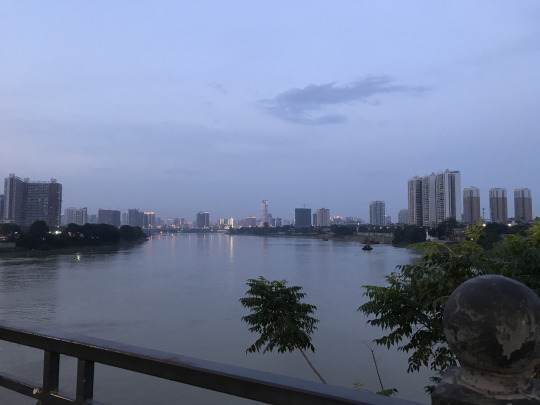
At any rate, it bothers me to no end that I have to use Bing, which takes you through a maze of irrelevant information but never gets you what you need. Not unlike the tuk-tuk driver has done so far. So, although I have the name and address of the hotel, no one seems able to locate it. The driver is very frustrated, saying it doesn't exist. I think of the return ticket. Have I been scammed twice in a single day? Am I that naive? Are the Chinese that deceptive? The driver doesn't want to waste any more time looking for it. He wants to be paid. I'm annoyed at him, but I give him 20 yuan. He complains, after all, we had agreed on 25. Yes, I tell him through the girl from New York, we agreed I'd pay him 25 to take me to the hotel, and he was lucky I was paying him at all when he had not delivered as promised. He waves his hand and walks away, happy to get rid of me.
The New Yorker helps me get a cab to take me to the hotel. She negotiates with the driver who will take me there for 30 yuan. Remember the Brazilian adage? I took a tuk-tuk for 25 not to pay 50 for a cab. Here we go. The driver checks the information on my phone a couple of times. He takes busy roads, crosses a bridge, and then I notice him looking around for the hotel. On one side of the street. On the other side. He shakes his head. He tries talking to me in Chinese. He stops the car and asks around. Nobody knows where the hotel is located. After about an hour, he calls a friend who speaks English, and through her, we talk. He can't find the hotel, it's supposed to be right where we are, but it's not. He has tried calling them, but it says that the hotel was relocated. Well, relocated to where? He shakes his head. That hotel doesn't exist anymore. Welcome to China, I tell myself. The driver urges me to call my friend. What friend? I ask. The one who called the cab, he says. She is not really a friend, I tell him, I had just met her at the hotel and don't have her phone number or anything.
I'm sorry for the driver. He has been with me for more than an hour, and he doesn't know what to do. Worse than his is my situation, but I read Eckhart's The Power of Now, and at the moment I'm sitting comfortably in an air-conditioned cab, so I'm fine, although I think of Thomas, who has probably already boarded the train to Hanoi, with a spec of envy. Everything seems so difficult in China. In the land of tai chi, nothing flows! Internet access seems symbolic of a larger problem. I feel the same oppressive attitude here as I used to feel while living in Brazil -- that bureaucracy at each step of the way to detain you from whatever you want to do. The arduous process of getting the Visa should have been an indication.

I tell the driver to leave me at any hotel. My idea is to get a room and from the hotel see what to do about the two businesses that ripped me off. He nods and drives to the first hotel, where he follows me inside. I'm surprised but I soon understand that he has not given up. He asks the receptionist if anyone speaks English. The three receptionists tell us to wait while they call the hotel's owner. He comes after a few minutes wearing a Hawaiian shirt and holding a cigar. (What's with hotel owners and Hawaiian shirts? As it turns out, this guy has more than that in common with the hotel owner from Phu Quoc Island.) The driver explains the problem. The man picks up the phone and calls the number on my reservation. He gets someone on the line who tells him that the hotel is located at the same address as always, just down the street. We get back in the cab and in about two minutes we're there. I'm happy and so is the driver. The receptionists don't speak English, but they use their cell phones to talk to me. Wi-fi is only available at the reception, so I sit there to compose an email to the ticket office. When I finally get to my room, it's past six thirty in the evening.
My room is spacious, with a large bay window and all the appliances I expect from a modest hotel. It also has many lights and as many switches, which I play with, creating different ambiances. The view is quite nice as I can see much of Nanning. After a shower, I leave the hotel for a walk. One thing you understand when you visit China is that they don't need the West. They're perfectly self-sufficient, with a rich history and culture and the average Chinese person is perfectly happy without ever hearing Western music or anything about our politics. And yet, most of them are also genuinely happy to make your acquaintance. Nanning is not called the "Green City" for nothing. There are many luscious parks in the city and I'm staying near one of them. The sky is still light, the weather is still hot, but there is a nice breeze as I walk in the park. People of all ages are there, talking, playing, riding bikes. After a while, I go to the Yonghe Bridge, from where I watch night gently falling over the city.
When I get back to the hotel I see I have an email from the travel agency. They tell me they have waited for me all day, and will be there early the next day. They also send me their address in Chinese to facilitate my finding it. I make myself a cup of tea, open my laptop and work a little. Outside my window shine the lights of Nanning. I have no idea what the sign in the building across the street says, but it doesn't matter.
I'm in China!
#mountholyokecollege#summer internship#southeastasia#studentslife#traveling#wanderlust#writerslife#china#nanning#money exchange#traintochina#yonghe#trainticket#greencity#chinese
0 notes
Text
Nanning (Part I)

I'm never ready to disembark when I get to my destination. My first reaction is usually "do I have to?" I like the ride. I plan for the ride and I'm curious about the people around me. Is it a coincidence that leads us to share that limited space and time with someone? We've chosen the same transportation, same destination, at the same time. What else do we have in common? What if something happens, -- the series Lost comes to mind -- how will we relate to each other then? Will I see your worst moments, will you see mine? I think of reports of "passengers of aircraft number so-and-so". In tragedy, a whole group of diverse people is reduced to "passengers". Sometimes the families of such groups get to know one another. I once heard of a man and a woman who met through the losses of their spouses in a plane crash and later fell in love and got married. And yet we sit next to each other hoping that we won't need to learn their name, that we'll be polite and keep out of each other's hair, and say goodbye as soon as we arrive at our destination. What a waste! Enjoy the ride, we often say to others, but most of us don't. I have had some memorable conversations while traveling, some of which are over twenty-five years old and I still remember. Many times something the person said, a suggestion about the destination or a warning, had a huge impact on my choices. And yet, I often take my seat in a plane or train with a mental list of things I want to accomplish; write, read, listen to music, usually in this order, and keep to myself. I stop at movies and TV series because I'd rather get to know my fellow travelers than watch something I can watch from home.
Does my attitude carry a deeper meaning? If life is analogous to a ride, how best to spend that time? With the people around me, I'd think. And will I get to the end of my life feeling like I'm not ready to step out of this vehicle, my body, and into another realm? Am I reading too much into it? After all, I've slept less than five hours and who can blame me for not wanting to leave the comfortable bed in the air-conditioned room for the scalding sun and heat in Nanning?
Besides, sleeping we don't have any problems, such as the three I must face as soon as I step out of the train; I don't have a return ticket; I don't have a cent in the local currency (yuan) and I don't know how to get to my hotel. Unlike Gia Lam, the train station in Nanning is big and crowded. I step out and follow the crowd through a long, grayish/white pavilion, which is clean with no seats. In fact, there is a sign warning against sitting here. I hope my fellow passengers know where they're going. I locate the exit, then explore the station a bit. The restrooms are not bad, but you must carry your own toilet paper. Almost no one speaks English, but talk to you in Chinese anyway. I find the ticket booths, one of which an "English" sign, so I get in line. The email I received told me to leave the station and walk for six minutes to find the ticket office, but I think the girl behind the counter will know something about it. In the same line is the girl who was in my cabin since she doesn't speak Chinese either. She greets me and we talk a bit while we wait. I realize I have a ticket number in my email and decide to try my luck at one of the machines on the other side of the room. But the machines have no English option. Travel, and you realize how much you don't know. I go back to wait in line. The clerk takes the printed email, looks it over and hands it back to me. "You have to go here," she says, pointing to the address, "to get your ticket."
"Yes, I understand that. Can you tell me where that is?"
"I don't know," she says impatiently. I really don't know why she's in a hurry since there's nobody behind me.
I examine the map in my hand, but it's so poorly printed that I can't even tell where I am. I leave the station. Outside it's unbelievably hot. I try to make sense of the map. It's hopeless. I look for someone who speaks English. No luck. I enter a Comfort Inn near the station, (thank God for air-conditioned!) and hope the receptionist speaks English. She does, but very little. I show her the address and she points to a street in front of the hotel. I ask her where I can exchange money and she tells me to go to the bank.
I brace myself and face the sun and heat again. My bag is getting heavy, but that's okay. As soon as I change the money I'll go to the hotel and take a nice, cool shower. But I want to get my return ticket first.
Numbers in Nanning are not as straightforward as in the U.S. My guess is that the characters refer to the house/commerce numbers, but I can't tell. The fact is that I don't know if I'm on the right street, and I'm not seeing many numbers. The numbers I do see are far from the number in my hand. After walking down this street and finding nothing, I decide to take a right, onto a busier street. A kid of about 16 sees me consulting the paper in my hands and asks if I need help. Relieved to be spoken to in English, I show him the address I'm looking for. He tells me the street I'm looking for is the one I just left, and we must go back to it. It makes sense, so we go back to the first street and look for the number. We finally find it, but there's absolutely nothing remotely resembling a travels agency there. He asks around, nobody knows about it. We keep looking, walking up and down the street. At one point he places his hand on my lower back and I automatically jump. The gesture is out of place and therefore offensive. Cultural differences apart, when did I ever give him the least opening to touch me? "Please don't touch me," I say and move farther from him. After that, I wish he'd stop 'helping' me, but he has taken it upon himself to find the address. Now I have four problems, and the one I decide to solve first is his presence.
I tell him thanks, but I can find the address by myself. He continues to follow me. I stop and wait for the traffic light -- unlike in Vietnam, Chinese rules demand obedience. He stops right behind me and waits as well. Around us there are, perhaps, six people, also waiting to cross the street. When it's time for me to walk, I slow down, and the group of pedestrians, like a wave, take him across the street. I turn instead to the sidewalk and rush down the street, without a look back.
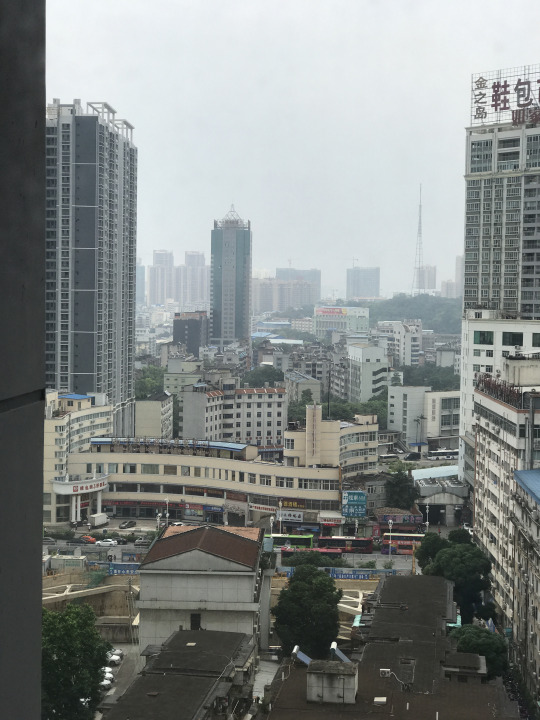
I have seen a bank before, and now I make my way back to it and ask if they exchange money. The one clerk who speaks English says they do. I tell her I need to exchange VNDs. She comes around the counter and asks for my passport. She examines it as closely as a border control officer. She checks passport origin, visa for China and visa for Hanoi. She consults with the guard, then makes copies of several pages of my passport. I'm not in a hurry, after all, the bank is cool and has a place I where I can sit. Once she makes sure my documents are alright, she tells me to wait. After a while, she calls me to the counter, where I place a couple hundred VNDs. She looks at the money and shakes her head. "We don't exchange Vietnamese Dongs here," she tells me. I sigh! After all the bureaucracy and wait you'd think she'd exchange family secrets! Vietnam is a neighbor country, dropping hundreds of people in Chinese territory daily, so WHY NOT? Her English is very limited and she just shakes her head and repeats, no, no Vietnamese Dong. "Where, then, can I exchange it?" The Bank of China, she quickly tells me and points to its direction.
At the Bank of China, I'm told the same thing in definitive and curt manner. I check with other banks and hotels, but no cigar. Some people are nice, even though the language barrier, but others seem annoyed by my inquiries. I spend some time working on one problem, once I get to a dead-end, I switch to the other; finding the ticket office. A helpful receptionist in a hotel points to a tall grey building a couple blocks away. The building has many stores on the ground floor. Filled with hope, I show the address and ask around. My first challenge is to find someone who speaks English, the next is to find someone who can read Chinese in Western letters. Sometimes they're self-conscious about their poor English and giggle more than speak. I want to tell them that their poor English is ten thousand times better than my Chinese, but I don't have the words. A girl of about eighteen figures out the address and tells me to go to the back of the building. Once there I ask the receptionist about the travel company but she's impatient with my questions so I decide to take the overcrowded elevator to the 17th floor and take a look around. I find the office number and it has the travel agency logo on a door, but it is locked. I knock many times, but it remains closed. This is Saturday around noon. Have they closed for lunch? Have they closed for the day? For the weekend? I sit on the hallway, rest my legs and arms, drink water and eat a snack I brought from Hanoi.
After about half an hour I decide to go down and ask the receptionist if the people from this office will be back today. But time only worked to increase her irritation and she tells me she doesn't know, even before I ask the question. I try showing her the address on my email. She sighs, picks up her cell phone, presses a few keys and turns the screen for me to read: this is not a train station. You have to go to the station. I try to explain that I've just come from the train station but she won't hear it, she wants me out of her hair. Fine, I relent.
As I get out of the building I'm so frustrated I can cry. So I switch to my other problem; exchange money. (Some defense mechanism, I suppose). I ask around, go from one bank to another, but everywhere I hear the same thing; we don't take VND here. I walk back to the station, thinking that someone there might have some information about currency exchange. I consider myself a resourceful person and anybody who knows me knows I don't give up easily but I'm tired, hot and hopeless. I don't know how to get to my hotel, I can't pay for a cab, I don't have a return ticket and can't even get a meal since I don't have yuans. Around me impatient people walk, most holding an umbrella over their heads, hurrying here and there. Nobody makes eye contact or even looks my way, even though I'm the only Western around.

Then I see him, a tall Western man walking in my direction. "Excuse me," I call to him. "Can I ask you a question?"
"Yes," he turns to me with an open face, ready to listen.
I ask about exchange houses. He doesn't know any, because he's not from Nanning, he's just passing by, about to leave, actually. He supposes they'll exchange at the bank. I tell him I've been to a couple of banks but they won't take Vietnamese Dong. He tells me he's actually on his way to Hanoi, and maybe he could exchange the money for me. He's holding an umbrella and his luggage, as we stand in front of the station and discuss the situation. He decides he doesn't need as much as I want to exchange -- although I'd gratefully a smaller amount -- and that maybe we better go to a bank.
"How do you like the Chinese?" He asks me.
"Well, I, uh... I think they're quite rude, to be honest."
"Rude? No, they're the opposite. They're really helpful and friendly."
I tell him of my experience thus far. He can't understand it, that's not the experience he has had with the Chinese. As we walk away from the station, we introduce ourselves. He's an Englishman, who has been living in China for the last six years. We walk from bank to bank and I notice that Thomas is treated like royalty. The same people who were curt to me now stop whatever they're doing to greet, try to help and joke with him. "It's not that they don't want to help you," he explains, "it's that they don't speak English. They're frustrated at their own inability to help you."
"Oh!" That little piece of information served as a paradigm shift and it made me see them completely different.
They're indeed helpful, but do not take Vietnamese dong. The guard at a bank tells us that he knows a lady who does this kind of business, and if we want, he'll call her and she should be there in a few minutes. Thomas tells him that we'll discuss the matter and get back to him. Would he mind if we sat down for a bit? No, the guard doesn't mind. So we sit in the air-conditioned bank, rest and talk about our interests and life philosophies. He asks me how I’m liking Sebastian Faulks and we talk about writing and literature. He also decides to buy my Vietnamese Dongs. After we finalize the transaction, the exchange lady walks into the bank and does business with other customers. I wonder which currencies she carries and what kind of agreement she has with the bank.
(To be continued.)
#mountholyokecollege#summer internship#travel#francesperkins#studentlife#writerslife#Wanderlust#southeastasia#traintochina#Nanning#chineseborder#Vietnam#chinese yuan#vietnamesedong#money exchange#englishman#guangxi#train station#trainticket#sebastian faulks
0 notes
Text
Night Train to China
When I go somewhere, I like to have a way out. Therefore, I'm uneasy about going to China without a return ticket, so after researching online I find a company selling tickets from Nanning to Hanoi. The procedure is lengthy -- you'd think I'm trying to buy property in China -- but, after sending them proof of ID, the payment goes through and I get a confirmation number. With the confirmation, they also send me an address and a map showing the office, which is located within 6 minutes walk from the train station, where I must pick up the ticket at my arrival. Simple enough.

Having secured my way back, I happily print the emails, pack the essentials and take the Grab motorbike my host kindly hails for me, which charges 30,000 VNDs instead of 50,000 a taxi would and go to the Gia Lam Railway Station, which is about half an hour away. I don't have Chinese Yuans, but I'm not concerned since I've been told that there are exchange services at the border and probably plenty of places and opportunities to exchange money in China.
The Gia Lam Railway Station is smaller and definitely shabbier than Ga Ha Noi. The waiting area is crowded with people who have spread their luggage all over the seats, so it takes me a little while to find a place to sit. The train comes some twenty minutes or so before departure time (9:20 pm) and we all file to get in. Allow me to rant a little about one of the most irritating Vietnamese habits, which is to cut in line ahead of anyone, without a moment hesitation or a word of regret. It's an interesting phenomenon because Americans have a reputation for being arrogant and entitled, but most Americans I know would never cut in line in front of anyone. In the U.S. rules are rules, and if someone comes first, that person goes ahead of the people who come later. In general, the Vietnamese are nice and unassuming but feels completely free to take their place in front of you, as though you are not even there. Sometimes they have a friend or family member in line, so they get in front of you to join them like it's the most natural and logical thing to do. Other times they cut in, look back and motion for their seven family members to join them.
At the Gia Lam, there's no clear line. We file haphazardly, the guard checks our tickets and passports, and allow us inside, where another guard switches our ticket for a card with the compartment number. I am told to go to number nine, and when I get there I have the whole place for myself. The four beds are white and clean, with two pillows and a blanket. Soon a guy and a girl, both about twenty years old, come in. She speaks a little English. They're going to Nanning, from where they will travel further North, in vacation. They are excited and talk happily to each other in Vietnamese. The girl has a lower bed and the guy the top one. I ask him if he wants to switch with me, so they can be side by side, and he immediately agrees and thanks me profusely.
As soon as we settle down, the compartment door opens. "Passports!" says the ticket inspector. We promptly give him our passports and he carefully takes notes on his clipboard. He returns our passports, we close the door and settle back down.

I'm happy to be alone in the top bed. The other top bed is empty until the next stop when another twenty-something girl comes in. She doesn't talk much, just greets us briefly, tosses her backpack with the teddy bear on the shelf at the foot of the bed, covers herself and goes straight to sleep.
I'm jealous, as I wish I could sleep too. As it is, I have some work to do. I take the laptop out of my bag and turn it on. There's no electric outlet in the compartment, but my battery will last me a while. Once I'm done with work, I read, pray, then slowly start drifting into sleep.
Suddenly I sit back up because I just remembered an important phone call I have to make to the U.S. Although it's close to midnight in Southeast Asia, it's around noon on a Friday back home, still business hour. The call takes about thirty minutes and then I lay back down. My compartment companions are sleeping, their breaths soft while the train rushes toward Vietnam's northern border. I love the sounds the train makes and imagine the fields it cuts through as it speeds into the night. Slowly I too drift into sleep...
A firm knock on the door wakes us up. Its urgency gets everyone to sit up and the guy on the lower bed opens the door. The conductor speaks in Vietnamese but by the others' prompt reaction I understand that we're supposed to get ready to go out with all our luggage, to be inspected at border control. We're leaving Vietnam.
Photos are not allowed at this immigration post. They quickly scan our luggage, then tell us to queue in front of the windows, behind which sits three officers. I do as I'm told, and am pleasantly surprised to see that there's open wi-fi at this place. It takes, perhaps, forty to forty-five minutes to get through everyone, and then we're back in the train.
I wonder what's between this first stop and the second one about 90 minutes away, at the Chinese border. Who claims the land between them? While between these two posts, in which country are you? You're no longer in Vietnam, but you're still not in China.
Once in the train, most people don't go back to sleep right away because we soon have to go out again and have our passports checked as we enter China. There's a clear contrast between the Vietnamese border and the Chinese one. The lights are brighter here, the guards more serious and the rules more rigid. People are called attention -- in harsh tones -- all the time because they haven't filled the arrival card, because they are not queuing properly or because they stepped on the yellow line instead of waiting behind it to be called.

When it's my turn the guard carefully compares the picture in my passport with my face. I want to tell him that the picture was taken four years earlier, and that I had been sleeping in the train and that I'm not exactly at my best right now and... He leafs through my passport. I take it he doesn't see many Brazilians in these parts and is wondering what on earth I'm doing here. I can explain. You see...
I realize that my basic information is showing on the small screen at the height of my stomach. Name, date of birth, nationality... Finally, he stamps my passport and the very satisfied, satisfied, not satisfied, very unsatisfied faces light up on my right. I press satisfied because I am, especially for being allowed entrance in China and for the fact that I can now go back to the train and sleep for the next five hours.
Life's good!
#mount holyoke college#summer internship#thegioi#vietnam#hanoi#nighttrain#traintochina#nanning#china#travel#writing#adventure#southeastasia#chineseborder#vietnamborder#writerslife#lifeatfifty#wanderer#wanderlust#traveling#studentlife#awesomeliving
0 notes
Text
Last Ten Days
In ten days I'll be going back home, therefore everything feels like a goodbye.

Will I walk this street again? Will I see this, go there, eat that again? I've made a list of things I want to do before leaving, some work-related, some things for the first time, and some places I want to return to, like Lenin Park, my favorite park in Hanoi. That's not saying much, though, since Hanoi has many, many parks, and I haven't been to even a quarter of them. In fact, it doesn't even make its way on most of "best parks in Hanoi" lists. Lenin Park is so vast and diverse that you can visit it every day for a month and find places you haven't been before. In one visit I join a guy for a bit of tai chi training, in another, I watch then chat with the couple practicing dance steps, on another, I join the group meditating and a young guy teaches me some breathing exercises. I have spoken often about the respect and even reverence I observed in my interactions with young Asian people, but this guy is not only polite and considerate, he is the ideal to which all the others aspire. First, he is beautiful, not in an aesthetic way -- although he is that too -- but the way he presents himself. Perfect posture, jeans, and a light blue, button-down shirt, neatly tucked in. His body is like that of a mannequin, on whose body clothes fit perfectly. He is clean, patient and loving, and his presence is soft like a constant but sweet light. His English is limited but he speaks clearly and well. "Hands like this as you breathe in. Good. Now hands like that..."
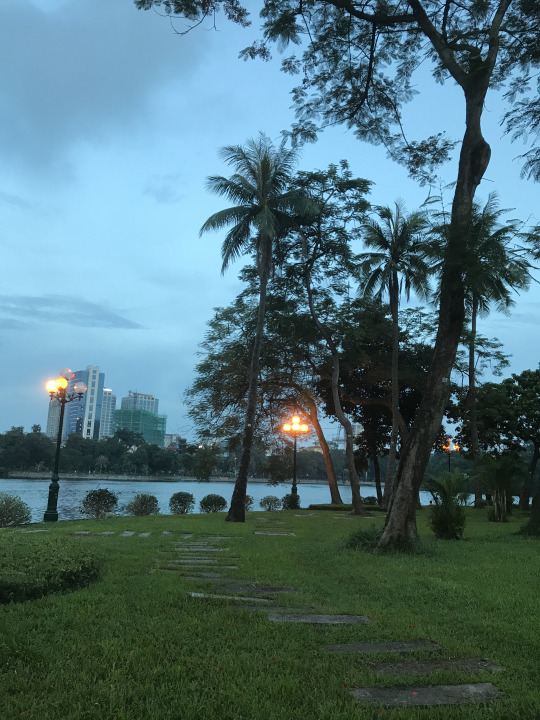
It's my last visit to Lenin Park, the sky is overclouded, it's hot as usual but there is a strong wind blowing today. I feel extremely sensitive. Attached, in a way, I didn't know I would ever feel, to this spot on the planet. After seven weeks here, I know my place in this city, in this world, a temporary stay that cannot be extended, that has to come to an end. I sit in my favorite place in front of the water. There's a magical light today, the wind brings sounds and memories, and I know that I'm in one of those crossroads of life. What now? I ask myself. I listen to the wind. It's bringing me answers, but I don't understand its language. As per usual, I have a book with me -- Engleby -- but I keep it closed on my lap. My eyes are on the horizon, the buildings and lights on the other side of the lake, as evening slowly falls. A song comes to mind:

"Yo muy serio voy remando muy adentro sonrío
Creo que he visto una luz al otro lado del río"
It's Thursday and I will probably not return to Lenin Park. I take my time here, knowing that I'll miss it.
Next day I leave work in the morning for a meeting at the Brazilian embassy. I've been curious about it, where it's located, and how it operates, and it's with a lot of excitement that I take a cab with both my supervisors to the meeting. It's a sign that you're at the right place with the right people when business meetings are this much fun. Later, on the same day, I visit the Women's Publishing House by myself, to review and reconnect with the strong and interesting women running that business. Like in the Brazilian embassy, this too is a good, light meeting, but filled with promises and opportunities.
I make my way back to the office, to try and work a little before going home. It's Friday, my last Friday at the office. Everything is a last now, and that's bittersweet. I'm so aware of myself, of the smells, the sights, of the people and above all, of this wonderful time of my life.
I feel alive!
#summer internship#mount holyoke#internationalinternship#vietnam#hanoi#thegioi#brazilianembassy#leninpark#travel#writing#writerstravel#nxbphunu#enjoyinglife
0 notes
Text
Chinese Visa (cont.)
I go back to the Chinese embassy armed with; passport and passport xerox copy, two passport pictures, traveler's insurance, one-way ticket (I've been told I have to buy my return ticket from China), a copy of the hotel reservation in Nanning and the filled-out-four-page visa application form. I also have downloaded in both my phone and computer, my bank statement for the last two months. I'm hoping the virtual image will suffice.
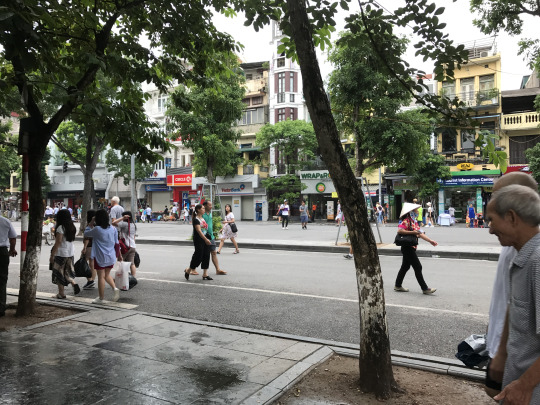
I wait in line, pass the metal detector check-up, and present my documents to the guard, who checks my photos, shows me where the scissors are, and tells me to cut them apart. Once I'm done he takes both of my pictures, staples one on the cover of my passport, hands my documents back and tells me to wait. I sit down next to an American guy in his early twenties. He indicates his passport with his picture stapled to it. "It says here that we're not supposed to staple anything on it". That's when I remember I had read that too. Oh, well! My fellow visa-applicant has just arrived in Hanoi and is hoping to get a visa for a three-month stay in China. After about ten minutes the guard sends him to window five. Having met the lady at that window I'm hoping he sends me to another, with someone who has learned how to smile. Once the American is done he tells me they need a phone number in Hanoi and that he'll get his answer on Monday. The guard interrupts him to tell me to go to window five. Sigh! Grumpy lady checks my documents and finds them wanting. "Where's the bank statement?"
"I have them in my compu--"
"No, I need the paper copy."
"But I--"
"There's a photocopy place over there," she points to the right of the embassy. She takes my documents, puts them aside and urges me to go get the copies of my statements.
I find the photocopy place close to the Singapore embassy. Three people run it and they are all busy. There are no walls around their business, just some makeshift tables for the computers and a tarpaulin to protect them from the sun. And yet, business is blooming. In fact, they don't need my business, I need theirs. I ask them if I can use their computer to download a file, one of the guys says no, he needs his computer. Can I just connect my computer to your printer? No. He asks that I send him the files. I tell him I don't have wifi. A young man, who I had seen previously at the embassy and who's there for the same reason, offers to share his wifi, which I eagerly accept.
But I'm uncomfortable with all that, wondering whether I'm giving away too much information, exposing my identity to theft, doing everything I've been told never to do, and while I'm thinking that, the guy hands me my printed bank statement. I pay 10,000 VNDs and rush back to the embassy.
The guard at the door already knows me and almost smiles. He is a serious young man, aware of everyone around him and highly competent. I do not like their system, but I'm in awe of his execution. He stands between the windows and the people like a conductor, his eyes sweeping the place and spotting misconduct or instances where his attention and interference is needed. He's serious but not unfriendly. I tell him that the lady at window 5 is waiting for me, he nods and steps aside for me to pass.
I hand her the statements for two months, even though she had not specified how many she wanted. She takes all my documents and gives me a paper with Monday's date on it. "Come back Monday at 4 pm."
"But how much--"
"Come back Monday. Monday at four."
I thank her and leave. The whole process is unsettling. I have no idea whether I'll get the visa or not. My only comfort is that I have done everything they asked to the best of my abilities. I decide to put the whole thing out of my mind for the time being and enjoy the coming weekend.
It storms all day Monday, July 17th, but as I'm about to leave the office to walk to the Chinese embassy, the rain mercifully stops. I arrive exactly at four and explain what I had come for. I have the impression the guard already knows and Monday afternoons are probably designated for getting answers on visa requests. "Window five," he says.
The lady at the booth gives me a pink invoice in the value of thirty dollars. "Pay at the bank and come back in two days." She writes the bank address on a piece of paper and hands it to me.
Does that mean my visa has been approved? I show the pink slip to the guard, who repeats the instructions: pay at the bank in the morning and come back to the embassy in the afternoon. I'm too excited to ask why I can't do both at the same time.
However, I still have a little problem; I don't have $30 dollars. All cash I had in USD has gone to pay for visas for Cambodia and Laos. To compound on this problem, I also don't have VNDongs. I have lost my ATM card, remember? My options are; a) cash advance from a credit card. Two problems with that; high-interest rate and the fact that I don't have the PIN with me. I could call home and ask someone to kindly go through a lot of papers to find it. I keep this option in the backburner. b) borrow money from someone, people who know me for less than two months. Not very promising.
I hope my host has collected the money I've transferred to her for the rent and is willing to lend me some. I'm trying a transfer service I have never used before (sendvalu) and in name of caution, I have transferred only half of what was needed. My agreement with my host is to send more than I owe her and have her return me the rest. We're expecting an email notifying us that the money is available any time now.
It's the night before I'm supposed to go to the bank and embassy and the money is still not available, so Thao kindly agrees to lend me the necessary to pay for the visa. "You're crazy about China," she jokes. She's mistaken. I'm not crazy about China. China is the lover who's trying to get away. I would be as crazy about Thailand or Cambodia, had I experienced so much trouble getting a visa to these places. Then again, it is true that I've loved the Chinese culture, especially Chinese medicine, for the longest time. And how could I not have a soft spot for the country where tai chi, the martial art I've practiced since 1988, originated?
I'm told that the bank does accept payment in VND, but charges about $200.000 VND to do so. That's about $9 I'd rather keep. So, next day I walk to the ICBC (Industrial and Commercial Bank of China), stopping at every bank on the way, hoping they can exchange Dongs into USD. My Vietnamese is as poor as ever and most bank tellers speak limited English, which makes communication a challenge. I explain what I need and they nod solicitously, but as soon as they see Dongs in my hand, they shake their heads and say that they don't sell dollars. I try, perhaps, ten different banks before finally arriving at the ICBC where I show the pink slip to the girl behind the counter. She tells me it's $30, and that's because I'm traveling with a Brazilian passport. Someone with an American passport would have to pay $140 (!).
"Can I pay with Vietnamese Dong?"
"No, dollar only."
"Where can I buy dollars?"
She writes the address on a paper and asks the guard to show me how to get there. He urges me to hire a motorcycle, but for someone who has walked for over an hour, ten minutes is nothing. I expected a bank but this is a currency exchange house. I enter it, prepared to pay a hefty fee for the service, but to my surprise, they don't charge a fee at all. As I walk back to the ICBC, I'm surprised at how much happiness those $30 dollars evoked.
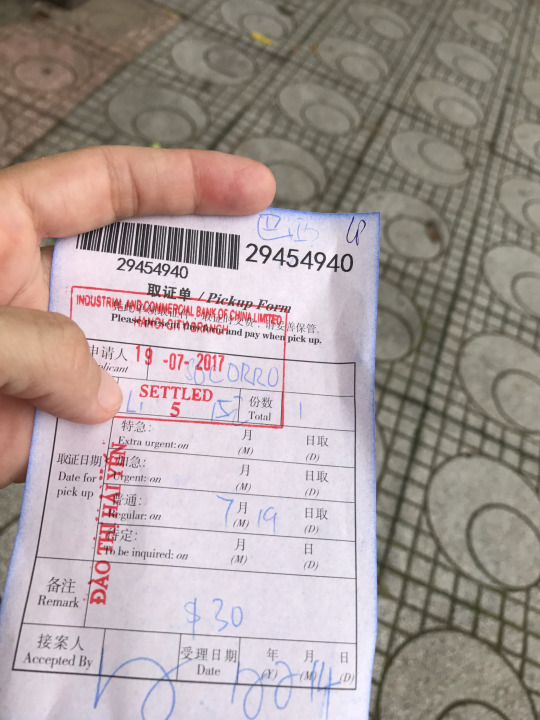
I quickly get my pink slip stamped and start on my way to work. Midway there I realize that a shortcut to the Chinese embassy will take about ten minutes while coming from work will take more than an hour. Yes, the guard had told me to go after 3 pm. but since I'm this close I decide to try my luck in the morning.
Once at the embassy, I show my stamped pink slip and they let me in and give me my passport. I open it and voila! the visa to China! I am thrilled to have it in my hands. In Hanoi it's July 19th, but in Brazil, it's still July 18th, 10 pm. Fifty years before, a little baby girl had been born in a tiny Brazilian village and her parents, the only two people present at her birth, decided to name her Miralva.
Happy Fiftieth birthday to me!
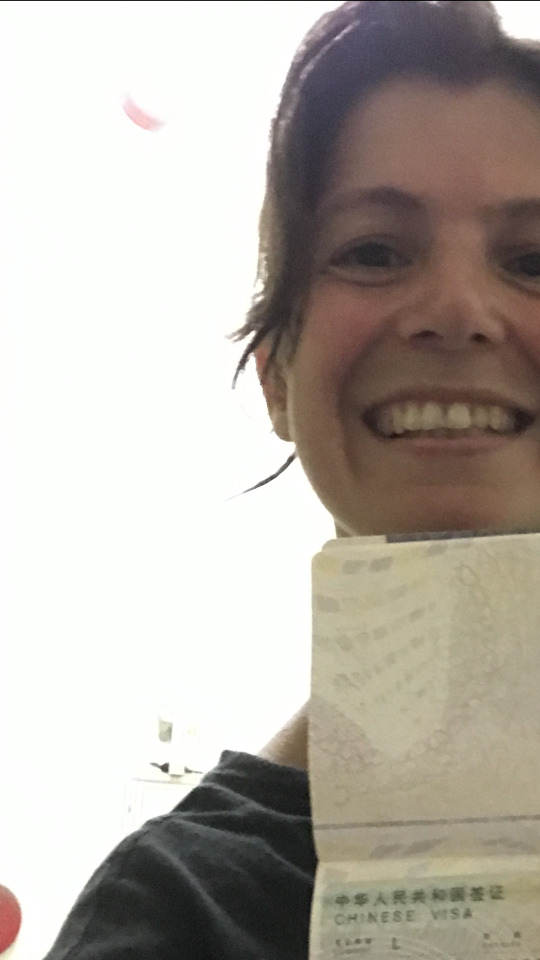
#mount holyoke#summer internship#chinesevisa#hanoi#vietnam#chineseembassy#icbc#fiftiethbirthday#sendvalu#icbcbank#china#vnd#USD
1 note
·
View note
Text
Chinese Visa
One of the main things on my to-do list is to get a visa to China. The idea of going to China grabbed me when I realized that Hanoi is not that far from the Chinese border. A little research showed that a train leaves every night to Nanning and the cost is about a hundred dollars both ways, which is close to nothing compared to an airline ticket from the U.S. to China. That's when I decide that only a fool would miss the opportunity to visit Vietnam's Northern neighbor.
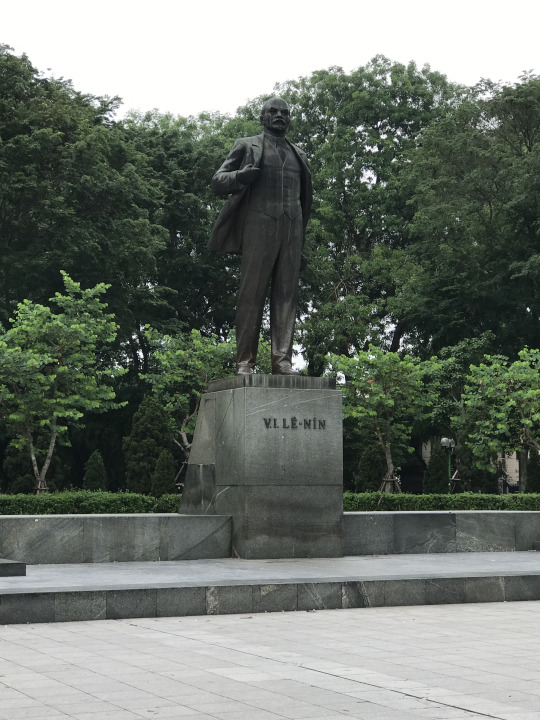
If you have been to the Chinese Embassy in Hanoi, you’ve probably passed by this statue of Lenin.
I had been to the Chinese embassy previously, equipped with a copy of my passport, two pictures, and some cash. After all, how hard can it be to get a Visa to China, right? That shows just how naive I was. A few hundred feet from the embassy I notice the people queueing under the sun outside. Let me explain about the sun in a place where temperatures range from 95 to 105 Fahrenheit. It sucks you dry through the perspiration process, which is great to cool our bodies but also dehydrates. So, it makes a whole world of difference whether you stand in the shade or in the sun. To keep people standing in line outside seems like needless cruelty. Not having an alternative, I get in line with the others and hope it moves fast. Every purse and bag has to go through metal detectors and every person needs to be thoroughly checked. That takes time. When it's my turn the guard wants to know what I came for. I explain that I need a visa to visit China. He asks to see my documents, which I willingly show him.
"Where's the ticket?"
"Ticket?"
"Plane ticket."
"I'm planning to go by train."
"You need the ticket," he sighs as if that was obvious. He hands me a piece of paper in which is there's a list of the requirements.
"Wait," I say, even though he wants me gone and out of his way. There are people waiting behind me. "I can't get the tickets without the visa, they won't sell them to me."
Another impatient sigh. He points to a window and tells me to talk to the lady there, which I do. I have just spoken to the world's friendliest guard compared to the lady behind the glass. "You need traveler's insurance, a place to stay, tickets and detailed itinerary."
I explain to her that I've been to a travel's agency and they didn't want to sell me the ticket without the visa. She sighs and shrugs as if to say, "not my problem!". And how much should I expect to pay? She hands me a piece of paper with the name of a bank and an address. "You pay here," she points to the paper. Every one of my questions is met with impatience, as though they're stupid and I'm very dim for not understanding how things work on my own. As I leave the embassy I feel completely deflated.
Since I'm planning to travel to Thailand, Cambodia, and Laos, I decide to work on those visas while looking to buy a ticket, insurance, etc. for the Chinese visa. The other visas are simple enough, but it takes time because they require leaving your passport when applying and coming two days later to pick it up. I put China out of my mind for the time being, and concentrate my efforts on the other visas.
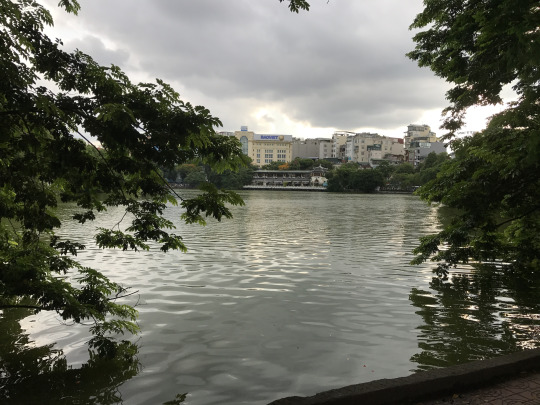
Now that I'm back in Hanoi, I start working on the Chinese visa again. I need to reserve a hotel, buy insurance and tickets. Hotel, no problem. Got one with free cancellation in case things went South. With the hotel reservation, I have a definitive date. At a bank I buy traveler's insurance only for the days I'll be traveling to China. Simple and inexpensive enough. Next step, tickets! How hard can that be, right?
I go to the Ga Ha Noi, the train station, and speak to about three people before one can give me information on trains to China. She quickly scribbles something on a piece of paper and hands it to me. It read Gia Lam. She's done with me. But I'm not done with her. What does Gia Lam mean? I ask. She ignores me. She has another customer and no time for "ignoramus" like me. I, on the other hand, have taken the time off work just for that, and, -- too bad for her -- ain't going anywhere. She turns back to me with an impatient sigh, realizing I'm still standing there. I ask the question again. She explains that no train for China leaves that particular station, that I have to go to the station she wrote down. I go home where Thao convinces me that, instead of walking or taking a taxi to the other side of Hanoi, I must go to a travel's agency and get the ticket from them.
Next day that's just what I do. The girl at the agency is incredibly nice but knows less about trains to Nanning than I do. She researches online, calls a few people and tells me that the train takes about 24 hours to get there. She suggests I take a bus. I tell her I will seek a better option and leave her office right at the moment the skies open and a great downpour comes down. I have my umbrella but this his Hanoian summer rain we're talking about, which comes from all directions and soaks you thoroughly. I see another travel agency -- remember, in Asia, they like to group businesses of the same kind together -- where I enter to get a second opinion while waiting for the rain to pass. My inquiries are met with a blank stare. It takes a moment until the girl behind the counter understands where I want to go. She consults her colleague, who also doesn't know anything about it. She phones someone to ask about it but gets nowhere. Soon a motorcycle stops in front of the agency and a girl comes in. When she takes out her helmet we smile in recognition, for she is the girl from the first agency. "Oh, it's you!" She says, meaning the person about whom they just called her. I explain that I wanted a second opinion. She laughs and says that the agencies are "same-same". Vietnamese people don't say "it's the same". True to their repetition habit, they say "same-same". I'm learning that speech concision is not as high a value here as in the States.
The rain hits the pavement and splashes inside the store. I'm not dying to go out but as the agency has no new information, I get up to go. The girl who just arrived is about to go home and asks if I want a ride. I do. We get on her motorcycle and face the blinding rain. She laughs as she takes a few streets in the wrong direction, dribbling cars and motorcycles as she goes, but somehow I make it home alive.
Seeing my frustration my roommate gets on the phone and makes a few calls, then hands me an address saying, "here, it's fifteen minutes from here. Tomorrow you go there. Today you can relax." So I do.

When you walk on the streets of Hanoi, you’re awarded by seeing cute dogs like the one above.
Next day I jump from bed early and happily leave home to buy the ticket. Life's exciting! Google maps must have a weird sense of humor, though, because it sends me through a way I don't recognize, but to a street, I am quite familiar with. It's a long street, so I think I'll eventually find the place. As I walk I ask for directions. Everyone points ahead. They can as well say, "just like Google is telling you", I shall reply, no, that can't be. Don't you know what's ahead? It's Ga Hanoi, the same station with the minimal customer service.
And here I am, in front of the same station, I was the day before. Weren't it July, I'd think I was locked into Groundhog Day. I can just turn around and go home but I decide that, since this was a different time of day, I might find a more helpful staff working.
I go in and see, to my dismay, that the same woman works both shifts. I tell her I have been told they sell train tickets to China. "Do you have a visa?"
"No. They won't grant me a visa without the ticket."
"We can't sell you a ticket without the visa."
"But I can't get the visa without the ticket." My exasperation was showing. Just a bit.
"No," she shakes her head. She's done with me. "Can't sell without a visa."
Another employee comes in with some fruits and everyone is happy with such beautiful produce. I'm annoyed but I wait. After a few minutes, she realizes that I'm not leaving. She speaks to her coworker about my case. They discuss the matter in Vietnamese, punctuating their conversation with head shakes. They're more interested in the fruits. I could use a fruit too but would settle for a train ticket to China. They exchange a few more words and tell me that they can sell me the ticket but if I don't get a visa, they will not refund me the money. I agree. She tells me how much it'll be and when I get my credit card she tells me no, they only take cash. She points to the door. "There's an ATM outside."
I run outside, meaning to come right back. But I don't. Because in front of the ATM machine I realize I do not have my debit card. I check my wallet and bag about three times, each time more convinced that yes, I have lost it. The card could have fallen from my purse at home, but I'm not very hopeful.
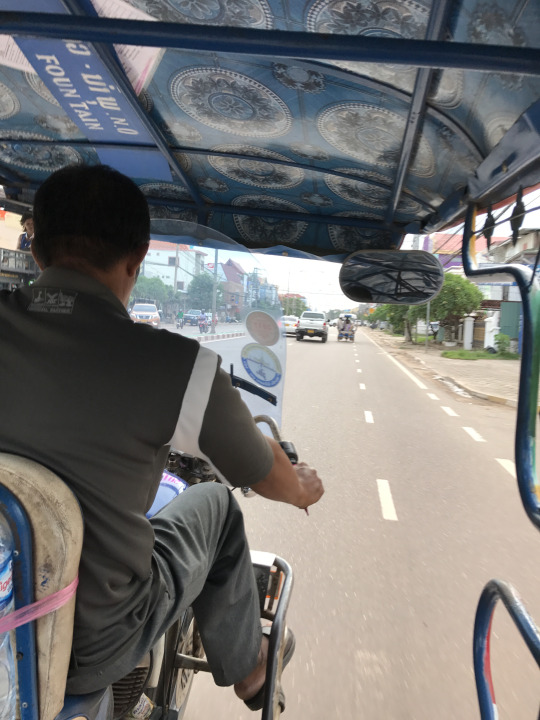
Leaving Laos (and my ATM card behind)
As I walk home I mentally retrace my steps. When did I last use my ATM card? In Laos! And I needed cash so badly and was so happy to get hold a few Kips that I didn't retrieve my card at the end of the transaction. How careless can you be? This never happens to me at home, and at home, it wouldn't be such a big deal, but here I don't know what I'll do without my ATM card. I have no more cash, not even to eat. Besides, if I don't buy the ticket ASAP, I can't apply for the visa the next day, and if I can't apply, I won't be able to go.
Once at home, I look for the card, but as I suspected, it isn't there. I call the bank, cancel it and am told that there has been no activity on my card since Vieng-Chan. This news calms me, somehow. Thao tells me not to worry, that she'll lend me money for the ticket so that I can get the visa. She calls a company who will deliver the ticket to my work that same afternoon, and with this bit of good fortune, I go to work.
When the guy from the agency comes I have my supervisor's wife with me, to read and make sure the ticket is legit before I pay him. I finally have the ticket and could go back to the embassy. But not the next day, since it is a Chinese holiday and the embassy will be closed.
#hanoi#mount holyoke#Summer internship#southeastasia#china#chinesevisa#chineseembassy#atm card#passport#nighttrain#Vietnam#gahanoi#gialam#googlemaps
0 notes
Text
People and Places
My supervisor tells me I've been invited to a wedding. I'm surprised because I don't know many people in Hanoi, and definitely not anyone about to get married. It seems, though, that weddings are a little different in Vietnam. The bride used to work at The Gioi and everyone who works there is invited, even though I've never met bride or groom.

The publishing house is actually much bigger than what I see on a daily basis, as some weird laws have forced the business to spread into different parts of the region. The wedding is on the thirteenth of the month, a Thursday, at lunchtime. The invitation comes in my name, accompanied with candy and tea, specially made for the occasion.
When the day comes I climb onto the back of my senior supervisor's motorcycle and we head to where the ceremony will take place. His motorcycle is just one of many parked at the front of the elegant hotel. Everyone is nicely dressed, but not overly so. Most guests just came from the office and will go back to work just like a regular day. For those invited, the wedding just makes lunch hour a longer and more interesting affair.
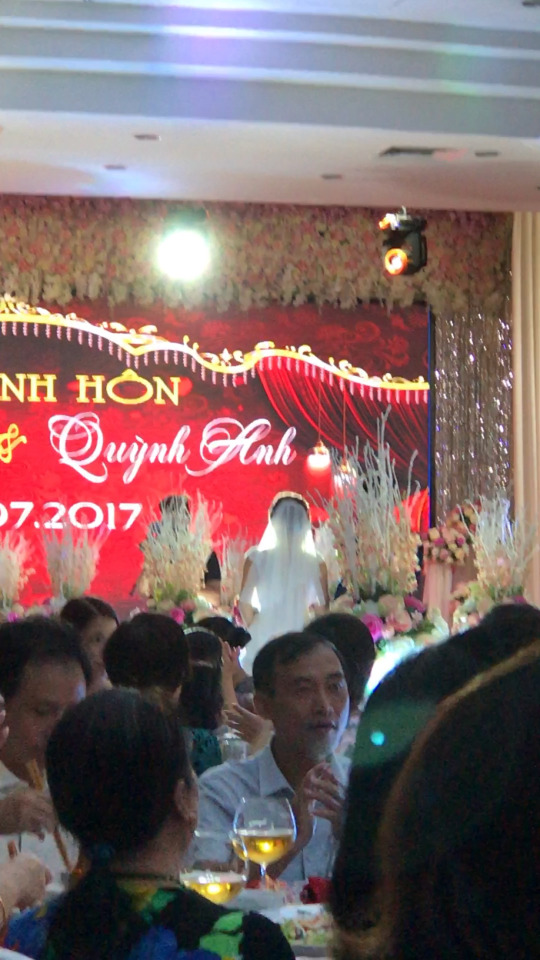
At my table, I only know my supervisor, who is culture incarnated and a great conversationalist. His English is also very good. He tells me about Vietnamese customs and what has changed in recent years. Like in the West, weddings in Vietnam have become a professional and glamorous event, rather than a romantic and spiritual ceremony. It resembles more a TV show, with a presenter and everything. The bride and groom are even entertainers, as they sing supposedly for each other, but it is in fact for their friends and people like me, whom they've never really met. The most romantic moment -- or perhaps that's just me -- is when they play Till There Was You, which was my wedding song some 28+ years ago. Dressed in their elegant attire, the couple's parents walk from table to table to thank the guests for coming. Based on the opulence of the place and richness of the food and decoration, I'd say the parents are quite wealthy. There are quite a few toasts and people drink, some more freely than others, and I wonder how productive work will be in the afternoon.
An hour or so later, I'm back at my desk, as is everyone else, working like just like every day. Somewhere not far from here, a new couple is probably still celebrating.

After work, I walk to Ho Hoan Kiem to do something I've been meaning to do since I arrived in Hanoi, which is to visit Jade Island and the pagoda located there. Coincidentally, I see a young woman in a wedding dress, talking to an older lady. I guess the oracles have designated July 13th, 2017 as a good day to tie the knot. This bride looks beautiful but annoyed. I turn toward the island. I came here once before, but couldn't enter the pagoda because I was wearing shorts. Today I'm properly dressed and am allowed in with a 50% discount after presenting my student ID. I walk over the iconic red bridge to the island and temple, which are not big but their location, history and captivating serenity make the place rather special. There are people taking selfies and pictures of the place, but I just want to sit and be here for a moment. This island is in the middle of the Hoan Kiem lake, a kind of cultural center in Hanoi, and sitting here I can feel the city buzzing around me. And yet, I'm alone with my thoughts. Breathe in, breathe out. Peace.
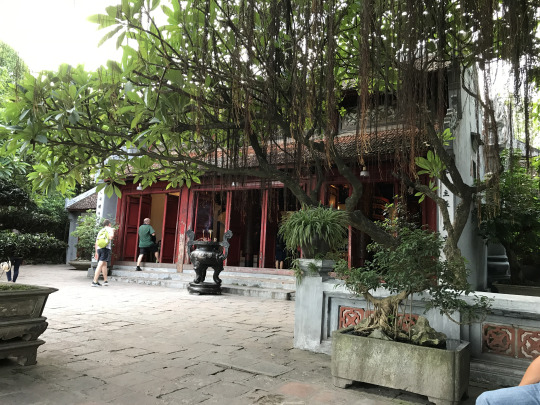
My friend Anush, the world traveler, is a great resource for anyone visiting pretty much any country in the world, for wherever you go, she's been there and got tips for you. She writes me, urging me not to leave Hanoi without seeing the Water Puppets. Lady, the guide, and friend who welcomed me in Vietnam, had also told me about the Water Puppets, a show of which she has written about. So that's been on my to-do list for weeks and on July 16th, ten days before my return date, I finally go to the theater. As I look for the place around the Hoan Kiem lake I come across a busy side street where merchants sell crafts, art supplies, and books. I browse their merchandise, especially the books. I'm surprised by the variety of genres, topics, authors, and languages. I even find a book in Brazilian-Portuguese among them.

I've always loved puppets. In fact, when I was a little girl living in the little Brazilian town of Sabinopolis, this was my favorite kind of theater. Well, it was also the only kind of theater in town at that time. The stories were created and performed by children slightly older than I and were honest, raw, and with a dose of violence, which kept me on the edge of my seat. The Water Puppets, in contrast, is a very traditional form of entertainment which counts with visual effects, clothing, songs and patriotic tales. The story is mostly lost on me, who don't understand Vietnamese. It recalls a simpler time in which agriculture and romance interlaced. The charming and humorous skits are executed with skill and grace. They perform to a full house most days and this Sunday is no different. The audience is comprised of different ages and nationalities. At the end of the show, as we file through the stairs leading to the exit, I hear people speaking in English and French besides Asian languages I can't even identify.
After leaving the theater I walk to the other side of the city for some cultural exploration. My destination is the Trấn Quốc Pagoda, but on my way there I have a chance to admire the Ho Chi Minh museum, mausoleum and Presidential Palace. The museum sits across from the green expansion where the mausoleum is located. Children and adults alike walk around, sit, talk and play. In Vietnam, there are countless posters of Ho Chi Minh holding a child, and one can imagine that he'd like the fact that his burial site is a place where so many families come to enjoy a Sunday afternoon.
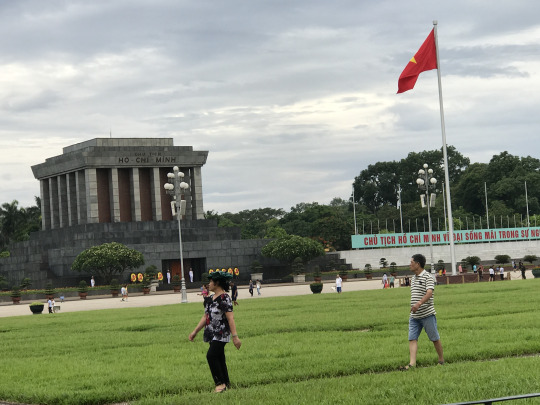
At the right side of the mausoleum is the Presidential Palace. Its bright yellow on a green bed under white sky catches my eye like a magnet. The streets in this area are wide and clean and the hustle and bustle are limited to traffic alone.

Presidential Palace
I've been walking for about fifty minutes when I arrive at the West Lake, where the Trấn Quốc Pagoda is located. The weather is lovely, right between storms, when a nice breeze hangs in the air, cooling it off. The temple itself is situated on an islet, Kim Ngu, which means Golden Fish. As in the grounds in front of the mausoleum, there are a lot of people walking around the lake, but that's nothing unusual, since the Vietnamese lives on the streets. In the enclosure of the temple, there is the Bodhi Tree, which came from the original tree in Bodh Gaya in India, where the Buddha sat and achieved enlightenment. The present was brought by Indian president Rajendra Prasad, at the time of his visit to Vietnam in 1959.
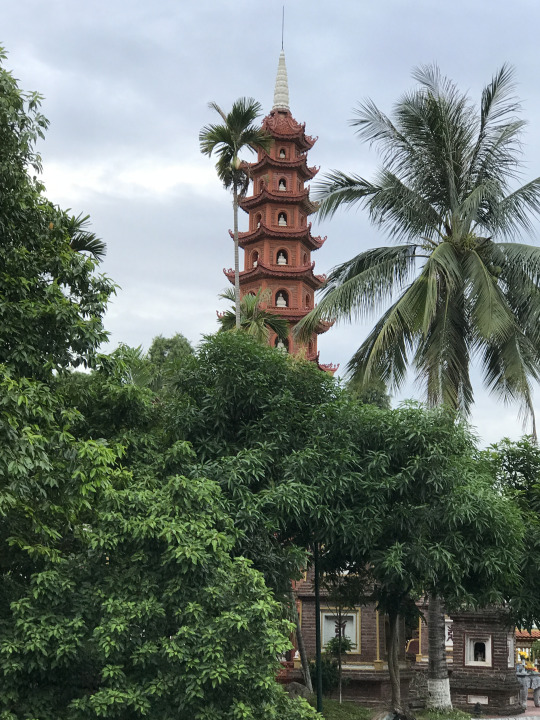
One thing about pagodas is their lightness, at least that's how I can explain their atmosphere. You sit in a place like this and you feel connected to the generations that passed before you and realize how transient this life is. Any problems seem small in light of this grand scheme of things and perhaps that's where that feeling of peace comes from. The only thing that matters, I feel as I stand before the temple's tower, with the breeze from the river gently touching my face, is the kindness we share with others.

After exploring the place for a while, I take the road back home, hoping I can hold on to that subtle yet profound feeling attained at the Trấn Quốc Pagoda.
#vietnam#hanoi#vietnamese wedding#pagoda#ho hoan kiem#mount holyoke#summer internship#tran quoc pagoda#ho chi minh museum#ho chi minh#water puppets#travel#traveling#southeastasia#mauseleum
2 notes
·
View notes
Text
Back in Hanoi
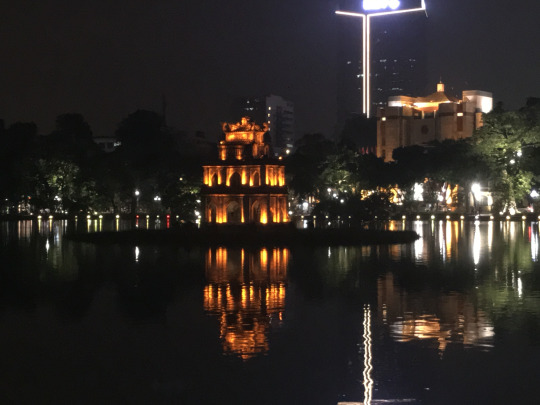
Hồ Hoàn Kiếm at night
My return to Hanoi coincides with our farewell to Abby, the only other American intern at The Gioi. She has been in Vietnam for a year, and as I watch her on her last days at the publishing house I anticipate my own feelings in two weeks. It's bittersweet. Yes, you want to go back home, to people, things and even problems you have left there, but you're also caught in the work, the people and the culture of this newly discovered country. You have figured out a few things about the language and about how life works on this side of the planet, but this is a knowledge that doesn't automatically transfer to another culture. You'll have to leave much of your new-found knowledge and the people you've met behind and that breaks your heart a little.
You'll also have to leave behind the identity you have developed. In the U.S. I'm a resident, a student, a mother, a wife, and a Tai Chi/yoga instructor. In Hanoi, my obligations are limited to being an intern in a publishing house, and that's why, although I work for forty hours a week, I feel like I have so much free time. My identity as a foreigner, a writer/editor, guest, and traveler, is not tied to a job or a function but are identities that I carry with me all the time, and especially while working. Phuong, another intern at The Gioi, asks me what I'll miss the most from Vietnam. I will definitely miss how safe I feel any time of day or night in the streets of Hanoi, but even more than that, I'll miss myself, the person I've discovered while here. That is, perhaps, the greatest gift from this experience.
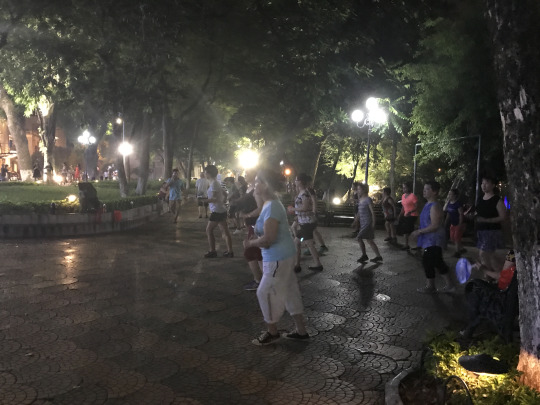
Nightlife around the Hồ Hoàn Kiếm - Hanoi
Out supervisor kindly takes us to Chay Anlac, which is a vegan restaurant on Trần Hưng Đạo street. I'm deeply grateful for his choice, as I can eat anything in the buffet without checking to see whether it contains animal products or not. Written on the wall is something along the lines "Live in a way that no act of cruelty will be done in your account". I like that. I also love the restaurant and based on how busy it is, I'm not the only one. At the center of the main room, stretches the red and yellow dragon, surrounded by varied and delicious dishes. There are seven people in our party, and I'm the only vegan. Their thoughtfulness in choosing a vegan restaurant on my account is rather touching. My supervisor has a way to dismiss my gratitude as though it's nothing. I attribute this to the charming Vietnamese subtlety.

Chay An Lạc 109 Trần Hưng Đạo Hà nội
We eat and talk and eat and talk some more because the food is so light. There are two floors and we are seated in the first one. Pictures of beautiful Vietnamese landscape decorate the walls. Lunch is 99,000 VND for each person, which converts to about $4.40 USD. It's about four times what I pay for the food on the same street, closer to my house, but the variety and quality at Chay Anlac are much better and worth every cent.
Two days later Abby leaves the publishing house for the last time. I miss her, especially around 3:30, which was our tea time. Now I drink tea by myself unless Phuong is around. Since I'll be leaving in two weeks as well, I make a list of things I want to see and do while I'm here. It'll be a busy fortnight.
1 note
·
View note